In proclaiming the faith and in administering the sacraments every priest speaks on behalf of Jesus Christ, for Jesus Christ.
Distinction Matter - Subscribed Feeds
-
Site: Novus Ordo Wire – Novus Ordo Watch
Vatican’s doctrine chief gives lecture…
Fernandez Clarifies Vatican Stance on Transgender Surgeries: OK in Exceptional, Severe Cases
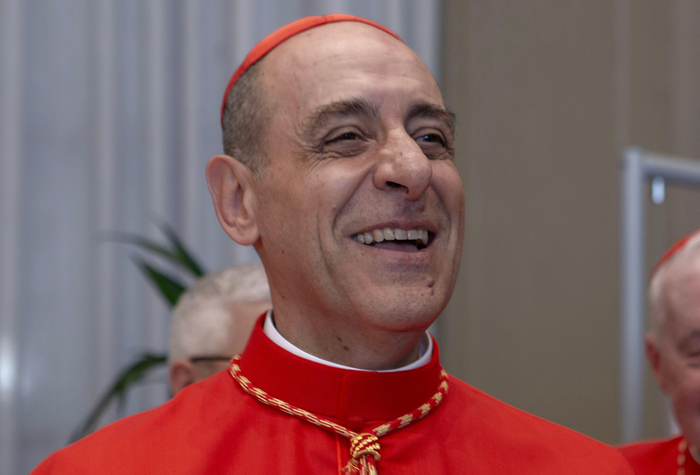 ‘Tucho’ Fernandez on Sep. 30, 2023 (image credit: Maria Grazia Picciarella/Alamy Live News)
‘Tucho’ Fernandez on Sep. 30, 2023 (image credit: Maria Grazia Picciarella/Alamy Live News)On July 1, 2023, the Vatican’s resident mystical porn author and notorious kissing expert, Victor Manuel Fernandez (b. 1962), was promoted by Jorge Bergoglio (‘Pope Francis’) to become the head of the Vatican’s Dicastery for the Doctrine Destruction of the Faith. We warned about him from the get-go, saying he would be Francis’ doctrinal undertaker in his new role, and indeed he has not failed to deliver.… READ MORE
-
Site: Public Discourse
Movement progressivism has arrived at a critical juncture. “Latinx” is out, pronouns are being removed from social media accounts, and dissent from what was once an untouchable progressive dogma—the full and equal participation of transgender-identifying athletes in women’s sports—is on the rise. Progressive leaders who championed (or at least appeared open to) ultraliberal immigration policies just a few years ago—including moratoriums on deportations, the abolition of immigration enforcement, and the decriminalization of unauthorized entry into the United States—now agree that illegal immigrants with criminal records should be deported, and quibble only with the far-reaching extent of the Trump Administration’s mass deportation efforts. Similar attempts from within American progressivism to rebrand have occurred on a variety of other cultural issues: from crime and policing to wokeness and cancel culture. High-minded moralizing is out; plaid shirts, profanities, and direct-to-camera explainers are in.
Certainly, political reality is motivating many of these shifts. Questioning the extent to which any supposed self-critical reflection is the result of an authentic crisis of conscience—or simply a calculated adjustment in the quest for electoral success—is completely legitimate. Still, if now does truly constitute a moment of reckoning for progressivism (at least for some), it’s important—both for our republic’s continued well-being and for the health of our cultural climate—that political actors make good use of this opportunity.
Here, I want to draw on some insights from contemporary liberal political philosophy to illustrate for progressives where the political rhetoric and cultural developments they championed over the past several years have fallen short of what a democratic society’s public discourse requires. Specifically, I will argue that two key principles found in modern liberal philosophy—public justification and mutual respect—mean that movement progressives owe their fellow citizens much more in the way of non-dogmatic public reasons, and of substantive (i.e., non-superficial) respect, than they have given in recent years.
Public Justification and Political Argument
Modern theories of political morality take almost for granted that, for political action to be morally legitimate, it must be publicly justifiable—that is, articulable with reasons that all citizens can be reasonably expected to understand, even if some of those citizens might disagree with the precise action being taken. Of course, the normative content that makes political action and political arguments publicly justifiable is a subject of perennial debate. The magisterial liberal philosopher John Rawls, for example, maintains that publicly justifiable reasons for political action—public reasons—must not be derived from sectarian and incommensurable comprehensive doctrines that all reasonable citizens cannot be expected to endorse. (Such doctrines might include Islam, Marxism, Catholicism, utilitarianism, or even an ideologically normative liberalism—i.e., a liberalism that is derived from a comprehensive account of human goods and flourishing.) Given the empirical fact of reasonable pluralism that persists in contemporary democratic societies, Rawls argues that political actors have a moral duty to ensure that their arguments and activities be articulable in a currency of basic principles of justice and basic political values—which themselves are meant to transcend the incommensurable components of (at least a plurality of) comprehensive doctrines.
Skeptics (myself included) would be quick to point out that the constitutions and orderings of political values and principles of justice that Rawls undertakes throughout his work are impermissibly normatively infused—and that, in any case, some kind of normative infusion seems inescapable when applying his theory of political morality to concrete situations and specific political issues. But the many problematic aspects of his methodology and his conclusions aside, the man who “looms over contemporary political thought, particularly on the left, in a way rivaled by no other scholar” was right that participation in the norms, strictures, and requirements of public justification, as well as the giving of public reasons—even if the specific parameters of such reasons are disputed—constitute crucial moral responsibilities of political actors. Publicly unjustifiable political action is immoral to undertake, and unjustified political arguments are insufficient for the public square, particularly in a democratic society in which citizens of fundamentally incommensurable commitments must live and work alongside one another.
Rawls’s liberal critics—both those of more traditional perfectionist schools of political morality, and those who wish to push his theory’s bounds further—agree on the moral imperative of public justification. Jonathan Quong, a prominent proponent of an expansive anti-perfectionist theory of political morality, writes that “the general aim of public justification” provides “no good grounds to resist the view that the requirements of public reason must regulate all our political decisions.” Bruce Ackerman says public justification is “the organizing principle of liberal thought.” These liberal philosophers—whose theories aim to provide the moral-philosophical basis for much of modern progressivism—agree: The public justification of political arguments demands, and the legitimacy of political action requires, the giving of universally accessible reasons for action.
Movement progressives should recover this understanding of public justification, and ground future efforts to advocate their social and cultural agenda in an acknowledgment that citizens must be allowed to freely and sincerely weigh progressive positions—and not be coerced or manipulated into accepting reasonably contestable views. Political actors—from legislators and government officials to outside advocates and interest groups—need to be able to provide substantive reasons, arguments, and evidence for their positions; they must not simply demand that skeptics fall in line or else be punished (whether through moralizing opprobrium, social ostracism, or more insidious means, such as politically motivated persecution). Non-justified—or unjustifiable—political action will provoke a reaction: the political pendulum will swing back when enough citizens have finally had enough of their due’s being denied to them. If public justification is, as the liberal theorist Stephen Macedo puts it, “the moral lodestar of liberalism,” progressives have a crucial moral duty not to shirk the responsibilities of public justification in order to realize a fleeting political high by immoral or morally questionable methods.
The Importance of Mutual Respect
For liberal theorists, the duty of public justification is often intertwined with a duty of mutual respect between citizens of differing commitments and beliefs. For Rawls, a constitutive element of his framework of public reason is a “readiness to honor the (moral) duty of civility, which as [a virtue] of citizenship help[s] to make possible reasoned public discussion of political questions.” He writes the following in Political Liberalism:
[S]ince the exercise of political power itself must be legitimate, the ideal of citizenship imposes a moral, not a legal, duty—the duty of civility—to be able to explain to one another on those fundamental questions how the principles and policies they advocate and vote for can be supported by the political values of public reason. This duty also involves a willingness to listen to others and a fairmindedness in deciding when accommodations to their views should reasonably be made.
To be sure, the political non-liberal finds much to object to in Rawls’s full account—most prominently, his effort to integrate acceptance of anti-perfectionist moral norms with his conception of reasonable citizenship and mutual respect. Nevertheless, some of his broader observations about mutual respect and civility are valuable—and are especially important for contemporary progressives to remember.
Because democracy implies “an equal share in the coercive political power that citizens exercise over one another by voting and in other ways,” Rawls writes, “understanding how to conduct oneself as a democratic citizen includes understanding an ideal of public reason.” Other political liberals—Charles Larmore, for instance—acknowledge that mutual respect (as manifested through civility, a commitment to reasonable disagreement, and respecting persons by acknowledging their equal moral worth) constitutes “the moral core of liberal thought,” whose “validity must be understood as antecedent to the democratic will.” In other words: No political agenda, no deeply desired policy preference, and no other end—even one favored by the popular majority—may override the first-order moral requirements of mutual respect.
As Larmore puts it, liberal political theory “owes a lot to Kant’s views about respect and treating persons as ends, never as merely means.” Some might regard that statement as inapplicable philosophizing. But if political liberalism requires as a rule that persons never be instrumentalized—indeed, if it requires respecting your fellow citizens and providing them with their due (e.g., publicly justifiable arguments, and continued respect even if they disagree with you) prior to any political considerations—then there are plentiful practices of modern progressives that need to be reevaluated. For one, many illiberal means of realizing policy victories are ruled out. The contemporary trend in movement progressivism of substituting, for arguments and evidence, insults and attempts to demonize or delegitimize one’s fellow citizens—for example, dismissing those who offer reason-based criticisms of progressive doctrines as bigots, sexists, transphobes, or racists—constitutes a profound violation of the moral norms that exist prior to political participation and democratic deliberation. So too does the use of allegations of “hate speech” to censor and deplatform the opposition. And so too does the ideological weaponization of the judiciary to curtail ongoing debate about controversial and reasonably contestable questions.
When movement progressives have transgressed the moral limits that mutual respect and the duty of civility establish, they have in a very real sense failed in their duties to their fellow citizens vis-à-vis the rights and duties that equal citizenship confers. Attempts to justify such behavior that are rooted in, for example, identity status or in-group membership are insufficient under the politically liberal framework. The demands of mutual respect set a higher standard for the public square—one that, again, subsists antecedent to any political considerations, and cannot legitimately be put on hold or cast aside.
Why? Because citizens with commitments and beliefs that are incommensurable with movement progressivism’s comprehensive commitments—even about fundamental questions of ethics, anthropology, identity, and the good life—share in the same political equality that citizenship confers on their progressive neighbors. Political liberalism recognizes this. For liberals, one must engage citizens whose deeply held commitments and beliefs challenge one’s own by using reasons—and even if certain political arguments or commitments are, in the eyes of some liberals, supposedly “unreasonable,” the citizens who hold them are nevertheless owed respect.
Political actors of all stripes fail to honor this principle when they try to shame, bully, or force their opponents out of the public square. Movement progressives ought to remember this, and ensure that their political activities uphold norms of mutual respect—even for those whose views they might find profoundly objectionable or immoral.
Now is a unique moment for movement progressivism. It is not often that a socio-political movement finds itself with the opportunity to undertake a relatively consequence-free examination of conscience (given that progressives are presently shut out of political power at the federal level and, according to some surveys, their institutions command historically low levels of popular support). As movement progressives reflect on their rapid and dramatic fall from power after what had seemed—just a few years ago—to be a pinnacle of progressive social, cultural, and political dominance, they would be well served to reexamine and recover these concepts that sit at the core of modern liberal political philosophy.
Image by Ashley and licensed via Adobe Stock.
-
Site: LES FEMMES - THE TRUTH
-
Site: Mundabor's blogI have heard Trump’s speech yesterday, live, all of it. As the speech progressed, it was clear that Trump wasn’t bluffing or posturing, and the biggest blow to Globalism in three decades was being dealt, with great energy, in a historical speech I will probably remember decades from now (provided I am still among the […]
-
Site: Ron Paul Institute for Peace And Prosperity
The tariffs President Donald Trump announced on Wednesday are massive in size and scope, Indeed, some early analysis indicates Trump has raised the United States average tariff rate to higher than did the Smoot-Hawley Tariff Act of 1930 that contributed to the American people’s suffering in the Great Depression. A big difference, though, is that Trump on his own was able to impose his sweeping tariffs this week, while the 1930 tariffs were imposed via legislation approved by votes and in the United States House of Representatives and Senate and then signed into law by President Herbert Hoover.
Though similarly costly for the American people as the new tariffs, the 1930s tariffs were at least put in place via a process more aligned with constitutional dictates. Among powers granted to Congress via Article I, Section 8 of the Constitution is the power to impose tariffs, though with limits that as with much else in the Constitution with time have been neglected. The Constitution does not make it a presidential power.
The state of things is that Congress has passed legislation to delegate further and further to the executive branch the power to impose tariffs. This seems unconstitutional, but it has been the way things have worked out over many decades. Thus we have the situation where the choices of one man regarding tariffs can in one day turn the world economy on its ear and subject the American people to significant new tariff tax burdens.
-
Site: Steyn OnlineWelcome to Episode 21 of The Girl on the Boat...
-
Site: Real Jew News
Highwayman
April 2 2025___________________________________
More Vids!
+BN Vids Archive! HERE!
___________________________________
Support The Brother Nathanael Foundation!
Br Nathanael Fnd Is Tax Exempt/EIN 27-2983459

Or Send Your Contribution To:
The Brother Nathanael Foundation, POB 547, Priest River, ID 83856
E-mail: brothernathanaelfoundation([at])yahoo[dot]com
Scroll Down For Comments
-
Site: LES FEMMES - THE TRUTH
-
Site: Public Discourse
On the first day of his return to the presidency, Donald Trump promulgated an executive order under the title “Protecting the Meaning and Value of American Citizenship.” It proclaimed that, beginning thirty days later, the policy of the government would be to deny citizenship to any child born thereafter in the United States whose mother was “unlawfully present” in the country, or present on a “lawful but temporary” basis (such as on a student or tourist visa), and whose father was not a U.S. citizen or permanent resident at the time.
As with numerous other executive actions of the new administration, this order was immediately challenged in federal court, and three district courts—in Maryland, Washington State, and New Hampshire—have enjoined it nationwide. In response, the administration has petitioned the Supreme Court to lift these injunctions (or perhaps to limit their geographic reach) while litigation in the lower courts proceeds.
Whatever the high court says in the near term on these injunctions, the basic issue will take longer to resolve. The immediate backlash to the president’s executive order reflects the dominant view of jurists and scholars that birthright citizenship extends to everyone born in the United States, with narrow exceptions—and that those exceptions do not include immigrants of any kind. Whether their parents are here lawfully or unlawfully, temporarily or permanently, children born here have long been considered automatically American citizens: this is the default position of American law. Is the Trump administration’s effort to alter that default position a reasonable one—perhaps even a salutary corrective?
To answer that question requires a historical excursion that begins with the Fourteenth Amendment, adopted in 1868—but then moves forward and backward from that landmark. The first sentence of the amendment, crafted in the Congress (in this case, in the Senate) in the spring of 1866, reads as follows: “All persons born or naturalized in the United States, and subject to the jurisdiction thereof, are citizens of the United States and of the State wherein they reside.” Plainly, at least from July 9, 1868 onward, when the amendment took effect, some people born in the United States have been citizens just by virtue of that fact. But who, exactly? Only those “subject to the jurisdiction” of the United States. And in these few words all the controversy is centered.
Fast-forward thirty years. In 1898 the Supreme Court decided United States v. Wong Kim Ark, a case concerning a man born to Chinese immigrants in San Francisco in 1873 who, upon returning from a visit to China (not his first such trip) in 1895, was denied re-entry into the country on grounds that he was not a citizen. His parents, denied the opportunity to become citizens thanks to federal naturalization law’s exclusion of Asians, had returned to China. Under the Chinese Exclusion Act of 1882, further entry of alien Chinese into the country was almost completely closed down, and Wong was a deportable alien if he was not a citizen by virtue of his American birth. But the Supreme Court, by a 6–2 majority, said that Wong’s birth here, even to parents who were themselves ineligible for naturalization, made him a citizen.
The Wong Kim Ark decision settled, in the American judiciary, the question of the citizenship of the children born in the U.S. to immigrant parents who are not (or not yet) naturalized. But the precise question settled concerned the offspring of those immigrants who were themselves residing here legally, and entitled to stay—as Wong’s parents were. No Supreme Court decision in the last 127 years has directly addressed the question whether the offspring of aliens present in the country illegally, or legally but with no presumptive right to stay, are American citizens by birth on our soil. The general presumption in American courts and executive agencies since Wong’s case has been that the answer is “Yes.” But President Trump’s executive order addresses precisely that question, and answers “No.” The children born here of foreign tourists, of sojourning international students, of guest workers, or of persons who entered the country unlawfully and are therefore subject to deportation, are not citizens, says the administration.
(A side issue not to my purpose here, yet vitally important in its own right, is whether the president, even if he is right about the Constitution, can accomplish this remaking of American citizenship law on his own authority, or whether what is needed is an act of Congress to the same effect. Even some of the supporters of the president’s policy preference, and his reading of the Constitution, have in the past said that legislation is necessary. The rest of this essay will sidestep this question of institutional authority, and treat it as all one whether the view of the Constitution’s definition of citizenship expressed in the president’s executive order were embodied in an act of Congress or not.)
We shall return to Wong Kim Ark, for the opinions in the case—by Justice Horace Gray for the Court, and by Chief Justice Melville Fuller in dissent—represent perhaps the best expositions available of the opposing views on the broader question as well as the narrower one in Wong’s case. But for now let us rewind to the Fourteenth Amendment itself. Why does the amendment open with a sentence about who shall be a citizen? And was this intended to be a change in the Constitution’s meaning on this question, or a restoration of it?
Framing the Citizenship Clause
The framers of the Fourteenth Amendment decided to set the terms of American citizenship for two reasons. First, it had never been done before. There are numerous references in the original Constitution to “citizens,” as for example in the qualifications to legislative and executive office (the president must be a “natural born Citizen,” for instance). And Congress is given power to “establish an uniform Rule of Naturalization” to make citizens of immigrants. But on how one comes to be a citizen aside from being a naturalized immigrant, the Constitution is silent.
Second, this very silence had been the occasion for mischief in the 1857 case of Dred Scott v. Sandford, in which the Supreme Court had not only invalidated a legislative prohibition on slavery’s extension into large western territories; it had also held that no free person of African descent, even if born free on American soil (let alone emancipated), was or could ever be a citizen. Hence the immediate purpose of the Fourteenth Amendment’s citizenship clause was to reverse this holding, which the amendment’s framers thought an obvious travesty. That is, they did not believe that Dred Scott had said a true but regrettable thing about who was or could be a citizen; they believed the ruling had said a false thing, and that the constitutional amendment they wrote would restore the status quo ante 1857.
The Thirty-ninth Congress’s first crack at addressing the citizenship question had come in the Civil Rights Act of 1866, passed earlier that year over the veto of President Andrew Johnson. Its language, saying “[t]hat all persons born in the United States and not subject to any foreign power, excluding Indians not taxed, are hereby declared to be citizens of the United States,” had been more cumbersome and imprecise, and moreover had been thought to lack a firm ground in any constitutional authority for such legislation. Hence the effort that spring to state the matter unequivocally in a constitutional amendment. Senator Jacob Howard of Michigan, in crafting the amendment’s citizenship clause, substituted “subject to the jurisdiction thereof” for the baggier “not subject to any foreign power, excluding Indians not taxed.” Some of his colleagues did not at first perceive that his more economical language did all the work of the earlier legislation’s language more precisely. Most could see that subject to American jurisdiction encompassed not being subject to another country’s, but some wanted the clause about “Indians not taxed” recapitulated. Howard explained that it was unnecessary, because his language accomplished that object as well—and did it more succinctly and exactly. In both the act and the amendment, Congress proceeded on the same understanding, but it expressed itself poorly in the act, and much better in the amendment. But what understanding is that?
The matter of the Indians, and of “any foreign power,” brings us to the heart of the issue—and our current controversy. What does it mean to be born in the United States and “subject to the jurisdiction thereof”? More to the point, who would be excluded from citizenship, as not “subject to [United States] jurisdiction,” despite being born on American soil?
In the congressional debates on Howard’s citizenship clause, two classes of persons were consistently identified as not “subject to the jurisdiction” of the United States, though born within its territory. The first class was the American Indians who were still governed by their tribes, usually inhabiting tribal lands, and whose relationship with the United States was governed by treaties (a practice later supplanted by direct congressional legislation under the commerce clause). The Indian tribes had long been considered (as Chief Justice John Marshall called them in 1831) “domestic dependent nations”— sovereign as to their own populations, no part of the American polity (not counted in the census, for instance, as even aliens were), but contained within the boundaries of the United States and having no status as foreign nations in international law. An Indian so situated would be born in but not of the United States. (Congress, by legislation, made all Indians American citizens in 1924.)
So too the members of the second exceptional class of persons born on American soil, the children of accredited diplomats representing other nations. At birth, such a person was cloaked in the sovereignty of his parent’s country, and was no part of the American polity. And a third class of persons who might be born in but not of the United States, though more hypothetical than real, would be the offspring of invading foreign troops inhabiting American soil. Each of these groups—the children of tribally governed Indians, of diplomats, and of invading enemies—was understood to be embraced in the sovereign bosom of some community other than our own.
Not so the child of the immigrant, or for that matter of any sojourner in America who was here to work, to study, or to travel. No cloak of foreign sovereignty enveloped these children and set them apart from the American community—whatever allegiance their parents might retain. The child of the alien, like the alien parents themselves, was fully “subject to the jurisdiction” of the United States—completely governed by our laws, and answerable to American political authority. This much is pretty plain from the debates of 1866 (though some advocates are determined to read them otherwise).
Would the answer be different for the children of aliens present on our soil unlawfully? In 1866, there was essentially no one fitting this description, for the Chinese Exclusion Act passed sixteen years later was the first federal legislation—other than the prohibition of the slave trade—that restricted immigrant entry into the country. So we cannot say that the Thirty-ninth Congress had “illegal aliens” at the back of its collective mind in drafting the “subject to the jurisdiction” phrasing of the citizenship clause. Furthermore, to fit the child of any immigrant, lawful or not, into the exceptions contemplated by that qualification would require us to substantially change in retrospect what was understood at the time by “jurisdiction.” We would have to take “subject to the jurisdiction thereof” to really mean, not “answerable to the authority of its laws,” but “inheriting parental allegiance thereto.” And this is not how American law—from the founding onward—had ever treated the born-in-America children of immigrants.
Background Principles of Citizenship Law
The dueling opinions of Gray and Fuller in the Wong Kim Ark case laid out the basic alternative understandings of America’s unlegislated background principles on citizenship since the founding, which the Fourteenth Amendment had merely restated and affirmed. As Justice Gray said for the Court, Americans had a received inheritance of the English common law, which since at least 1608 had held that every person born on sovereign British soil (children of diplomats and enemies, again, excepted) was a subject of the Crown, owing allegiance to the monarch for life. This was known as the jus soli—“right of the soil”—principle, and Gray regarded it as the true original principle of American citizenship law, which the amendment had restored.
Jus soli taken in full meant, as of the eighteenth century, that a British subject had no right to expatriate himself—breaking his allegiance to the Crown—by emigrating to and becoming naturalized in another country. But a “no expatriation” rule did not sit well with a people who had declared independence from the British crown and “expatriated” themselves en masse. So a modified form of the principle, gradually dropping the no-expatriation or lifelong-allegiance element of the common law, became the American norm. Such partial adoption of the common law, with modifications, was not a strange thing in the American experience; commentators frequently remarked that even in the colonial era the common law was (as Justice Joseph Story put it) “our birthright and inheritance, and that our ancestors brought hither with them upon their emigration all of it, which was applicable to their situation” (my emphasis).
Chief Justice Fuller’s dissent in Wong’s case, on the other hand, rejected the idea of modification in the inherited common law principle, insisting that at the Revolution the jus soli norm was simply discarded in toto. If Americans are citizens simply because they were born here, said Fuller, then the whole “feudal” package of the ancient common law is intact, including an absolute bar on expatriation. How then are Americans made, according to Fuller? Relying on the European “public law” theorists of the Enlightenment, such as Vattel, rather than the English common law, he said that citizens “are those born in the country, of parents who are citizens.” And he said that, by nature, those born to American parents outside the United States are citizens as well. Thus Fuller’s principle, by his own terms more “Roman” than “feudal,” was the contrary of jus soli: it was jus sanguinis—“right of the blood”—though Fuller nowhere used that Latin phrase.
These really are the only alternatives—jus soli and jus sanguinis, place and parentage. While the former is common in nations inheriting the English common law, many countries choose the latter. (I learned recently, for instance, that if certain conditions had been just a little different, I might claim Italian citizenship by descent from my great-grandfather who came here before 1890.)
One school of thought today—call it the Claremont school, espoused by leading lights of the Claremont Institute—holds that there is a third way to look at the basis of citizenship, neither jus soli nor jus sanguinis. This third way, the “social compact” basis of citizenship, has some affinity with Fuller’s Wong Kim Ark dissent, but more elaborately claims that the Declaration of Independence makes every American’s citizenship dependent on his or her active consent to our political order, in word or deed. The naturalized citizen takes an oath; what of the born citizen? Claremont’s Edward Erler—who argues that Wong Kim Ark was wrongly decided—avers in his 2022 book on this subject: “When a child is born into a society based on compact, his allegiance follows that of his parents until he reaches the age of consent. . . . At this point, he can elect to remain a citizen in the society of his birth. . . .”
This does not bear close scrutiny. Erler’s social-compact basis is really a papered-over jus sanguinis. And it might almost work for the child of American parents, born in America or anywhere else. For the child of immigrants who have not been naturalized, on the other hand, Erler’s account is jus sanguinis—the child’s citizenship being that of the parents’ native country—until adulthood, when it magically becomes jus soli upon his simply staying put in the United States. It is telling as well that this account does not call for the U.S.-born child of immigrants to undergo formal naturalization—something, as we will see below, that the law has never required.
The failure of the social-compact theory of citizenship is that, well, it’s a theory, and an ahistorical one. Far be it from me to deny the attractions of the Declaration of Independence. But American practice on the ground, from the founding onward, has been consistently on the common law’s jus soli basis, suitably adjusted over time for the right of expatriation. A number of interesting legal cases, for instance, arose from the circumstances of the Revolution itself, which was a civil war in which two peoples emerged from what had been one. Some loyalists successfully expatriated themselves, while others were understood still to be American citizens, sometimes to their cost, sometimes to their benefit. But in every case I have seen throughout the antebellum period, jus soli was the rebuttable presumption—sometimes indeed rebutted, but always the beginning of the analysis was where the party in question was born, not to whom.
Legislative and Executive Views of Citizenship
In addition to the judicial decisions often discussed on this question—and the early legal treatises often consulted—we should look to another pattern of practice, both contemporaneous with the founding and consistent afterward. First we should look to what Congress said. The Constitution may have been silent on the basis of birthright citizenship, but Congress clearly embraced the jus soli principle from the beginning. The first Naturalization Act, passed in 1790, made it easy for immigrants to become citizens (if they were free and white, that is): they needed only to live in the country for two years, stay in one state for at least a year, be “of good character,” and take an oath to support the Constitution. Any minor children of the immigrant “dwelling within the United States” (that is, who had immigrated with their parent—no need to specify what country they’re in if they were born here to the naturalizing parent) would also become citizens at that time.
Then there’s this interesting sentence: “And the children of citizens of the United States, that may be born beyond sea, or out of the limits of the United States, shall be considered as natural born citizens.” In other words, while the law did not address itself at all to the citizenship of children born in America to immigrant parents prior to the latter’s naturalization, Congress thought it necessary to legislate the citizenship of the children of Americans born outside the country. The silence on the American-born children of resident aliens, and the felt need to speak to the situation of foreign-born children of Americans, can both be accounted for only by the fact that jus soli—born here, citizen here—was the governing presupposition.
Every naturalization act has embodied the same understanding. (And the use of the precise Article II phrase “natural born citizen” in the 1790 act suggests that Congress didn’t want to bar children of American emigrés or travelers from being eligible for the presidency. That expression was not used in subsequent naturalization acts.) Most importantly, no naturalization act in American history has ever contemplated the necessity of naturalizing the American-born children of immigrants. The governing presupposition of every congressional enactment on the subject has been that the citizenship of such children is assumed, whether their parents have been naturalized or not, or indeed ever become so.
The naturalization laws passed by Congress became more detailed and complex over time, but this tacit presupposition of jus soli for American-born children of immigrants is an unbroken thread. In 1906, in its most elaborate legislation yet on the subject, Congress included the templates for forms to be filled out by the applicant for naturalization. Those forms inquired when and (if by sea) on what vessel the applicant for citizenship arrived in the United States. The alien applicant for membership in the American polity has always been presumed to be from elsewhere, never born here. Smuggling jus sanguinis into American law, openly or under cover of an illusory social-compact theory of citizenship, flies in the face of what American law in practice has invariably done on the subject.
It bears reiterating that there are just two ways to become a U.S. citizen: birth on the soil, and naturalization of the alien-born. There isn’t a third way—Italian son of Italian immigrants, born here but somehow remaining Italian until magically turning American at the social-compact age of (say) eighteen, without benefit of naturalization.
In addition to the evidence of Congress’s legislation, from long before the Fourteenth Amendment to afterward, there is also evidence of the same understanding of American law in the executive branch, both before and after the amendment, as embodying the jus soli principle. In 1854, Franklin Pierce’s secretary of state, William Marcy, wrote in an official response to an inquiry that “according to the common law, any person born in the United States, unless he be born in one of the foreign legations therein, may be considered a citizen thereof until he formally renounces his citizenship.” And during Ulysses S. Grant’s presidency, Hamilton Fish—considered one of our greatest secretaries of state—described the Fourteenth Amendment in 1871 as “simply an affirmance of the common law of England and of this country, so far as it asserts the status of citizenship to be fixed by the place of nativity, irrespective of parentage.” Fish went on to give the same account of the “subject to the jurisdiction thereof” qualification that we discussed above, saying it covered those “who may be within our territory with rights of extraterritoriality.” The standard nineteenth-century compendium of State Department documents is chock full of such official opinions on this subject, each one treating jus soli citizenship as the rebuttable presumption for anyone born in the United States.
In short, there is an unbroken pattern of legislative, executive, and judicial understanding, from the founding to the Reconstruction period to the present, that the children of immigrants in general are presumptively American citizens if born on American soil.
Does Immigration Law Matter for Citizenship?
This leaves President Trump’s executive order one slender reed to lean upon: its exclusion from citizenship of children whose parents are in the country unlawfully. (I leave aside the still more dubious exclusion of the children of legal sojourners on temporary visas.) To put the case most pointedly: can even Congress, by legislation, say that the Fourteenth Amendment withholds citizenship from such persons?
I think not. Aliens illegally present are no less “subject to the jurisdiction” of the United States and answerable to its political and legal authority than are those legally present. Neither they nor their offspring enjoy Hamilton Fish’s “rights of extraterritoriality.” They are not enveloped in the sovereign embrace of another country’s protection while here, with immunities from American law and judicial process, like visiting diplomats and their children. They are not members of quasi-sovereign “domestic dependent nations” within our borders, as the tribal Indians were in the nineteenth century. And no, neither are they the offspring of an invading army waging war against us.
And if Congress could divide the American-born children of immigrants into camps of the blessed and the damned—offspring of legals here, of illegals there, or of green-card holders here and of temporary-visa holders there—then this would amount to saying that Congress could invent a new jus sanguinis principle, hitherto alien to American law from the country’s inception, in which parentage mattered and place of nativity did not (or at least was negotiable according to legislative will). Could Congress, at any time, close off the country to all immigration, and say that henceforth all children born here to any aliens still resident in the country are deportable aliens? According to the only logic that can support the president’s executive order, the answer must be “Yes.”
But that is not a plausible scenario when placed next to this language: “All persons born or naturalized in the United States, and subject to the jurisdiction thereof, are citizens of the United States and of the State wherein they reside.” The logic of denying citizenship to the American-born child of any immigrant has its own momentum, and can stop only when it has completely destroyed any reasonable reading of what the Constitution has to say. Thus the rationale of the executive order makes a mockery of two and a half centuries of American law on citizenship, as continuous before the Fourteenth Amendment as after.
Illegal immigration is unquestionably a problem of great concern to many Americans. The citizenship of the American-born children of illegal immigrants unquestionably complicates our border control and deportation policies. But the Constitution’s grant of citizenship cannot be a function of Congress’s immigration laws, let alone of a president’s executive order written on the basis of those laws. Only a constitutional amendment could unsay what the Constitution conclusively says on that question: born here, citizen here.
Image sourced via Wikimedia Commons.
-
Site: Rorate Caeliby Father Richard CipollaSaint Josaphat's, Flushing, Queens (New York)Today we mark Laetare Sunday, so called because of the first words of the Introit of the Mass, “Laetare, Jerusalem”, rejoice O Jerusalem. This day marks mid-Lent and so Mother Church allows the use of rose vestments, flowers on the altar, use of the organ, as a time of anticipating the joy of Easter even amidst the New Catholichttp://www.blogger.com/profile/04118576661605931910noreply@blogger.com
-
Site: Voice of the Family
The spectre of the Yalta conference hovers over Europe while international observers consider the possibility of an end to the war between Russia and Ukraine and the conditions of a possible ceasefire. It is still premature to go into the negotiations underway between the United States and Russia, yet the analogy with the Yalta agreements […]
The post From Yalta to Moscow: 1945–2025 appeared first on Voice of the Family.
-
Site: Voice of the Family
This article follows Born of the Virgin Mary (1) History records that, when the Gospel is announced to a people, women always show a particular sympathy for the word of life and habitually outstrip men in their eagerness to receive it. One might say that Mary’s docile response to the Angel, “Behold the handmaid of the […]
The post Born of the Virgin Mary (2) appeared first on Voice of the Family.
-
Site: Voice of the Family
“But Jesus hid himself.” (Jn 8:59) Jesus Christ “is the true light which enlighteneth every man that cometh into this world” (Jn 1:9) He enlightens all; but he cannot enlighten those who voluntarily shut their eyes to the light; from them the Saviour hides himself. How then can they, walking in darkness, escape the many dangers […]
The post On the danger to which tepidity exposes the soul: sermon on Passion Sunday appeared first on Voice of the Family.
-
Site: Mundabor's blogAnd it came to pass that, after yours truly published his obligatory tribute to Val Kilmer, I went around on the internet to look for his way of death, and try to have an idea whether the guy was minded about his salvation; of course, only after I said my “eternal rest” for the guy. […]
-
Site: RadTrad Thomist
-
Site: Public Discourse
Today is the twentieth anniversary of the death of Pope John Paul II. Regardless of your beliefs—religious or not, Catholic or non-Catholic—his passing is worth commemorating. He was a man in full and a figure of global-historical significance. It is for good reason he has come to be popularly known as Saint John Paul the Great.
His personal story is compelling. He experienced significant loss in his family, attended an underground seminary during the Nazi occupation of Poland, and became an accomplished athlete, playwright, actor, poet, and philosopher who resisted the Evil Empire and served as pontiff for more than twenty-six years—during which time he renewed Catholic moral theology and played no small part in the downfall of the Soviet Union. His was an astounding life. To take but one example, during his first papal trip to Poland in 1979 it is estimated that nearly one-third of Poles saw him in person. Furthermore, within a year of his famous Warsaw speech in which he called on the Holy Spirit to descend and “renew the face of the earth,” Solidarity launched the Gdansk strike, sparking the end of communist rule in Poland and eventually the end of the Soviet Union itself.
To my mind, however, his legacy is not principally defined by grand public and political events, but by a single word—“person.”
While a student at the Angelicum he wrote his first thesis under the famous “Sacred Monster of Thomism,” the Dominican theologian Reginald Garrigou-Lagrange, who was not supportive of the future pope’s habilitation thesis on the personalism of Max Scheler. But it is personalism—albeit a version far more advanced than Scheler provided—that explains John Paul II’s interventions at the Second Vatican Council as well as his thought and writings as a scholar and pope.
In spite of the long battles about its meaning and implementation, we are actually still in the early days of Vatican II. Some suggest the Council was a major cause of the dissent, confusion, and collapse of vocations and Mass attendance in the decades that followed it; others think it was mistaken about many substantive things, perhaps even erroneous or heretical. Certainly some of its documents read as overly sanguine about the conditions of the world, and too optimistic about the Church’s accommodation of the world. But the idea that the Church was healthy and robust prior to the Council is unpersuasive; more likely it had the appearance of health—numbers—but had been somewhat hollowed out and lacking in heft. If it had been exceptionally healthy, people wouldn’t have so quickly dissented and departed. The Council occasioned a crisis, perhaps, but it did not cause it. And fundamentally, the Council was necessary for the times and the challenges of those times.
The Council recognized a truth, namely, that the history of modernity—Reformation, Enlightenment, liberalism, ideologies, the wars (from the Wars of Religion to the global wars of the early twenty-first century)—had diminished the Church’s institutional power, not only as a political actor in global affairs but even as teacher and mother of her own children. Modernity, for better or worse (I tend to think for better, but some disagree), had recognized and insisted on the dignity of the individual—the so-called “turn to the subject.” The individual understood himself as possessing responsibility and agency, not only with respect to politics but also in knowledge, choice, and religion.
As Servais Pinckaers has documented, for centuries the Church’s moral theology and practice had overemphasized externals and behaviors while overlooking the personal nature of action. Law and will had been explained as if in conflict, where the individual’s will confronted an external law—whether political or divine—limiting and confining the person and his choices. Law and freedom were in tension, with the law imposed and at war with the will. The Church formed and guided her members in a similar fashion, Pinckaers argues, with emphasis on external behavior and external penances: “You did this, well then you must do that in payment.” But this is not adequate to the reality of the individual person or the person’s actions, let alone how persons develop morally or repent.
As John Paul insisted, the very nature of ethics and moral theology is rooted in the following: I ought to do (or not do) x, and the doing (or not) of x does not only constitute good or bad states of affairs in the world, but it also makes me good or evil, righteous or unrighteous. As such, I bear enormous responsibility—for my actions constitute who I shall be, whether just or unjust. The perspective swivels here, away from a distant, detached observation of behaviors and goods and bads in the world “out there”—a third-personal perspective—and to the reasons, intentions, and acts of the person—the first-personal perspective. Now, not only is this a recovery of genuine ethics, which concerns the truth of what ought to be rather than what is, but it properly places the agent—the person—at the heart of the drama of his own existence. As John Paul II noted in his theology of the body, it is true that from a metaphysical or cosmological point of view we are human beings, but from the ethical and phenomenological perspective—the one that matters to us as agents—we are “in search of our essence.” Persons are not static natures or essences (although they have those), but are rather more—agents forming their character.
Persons act and in so doing constitute their characters, thus having responsibility for themselves. From this much follows in the thought of John Paul II. The natural law is not external or imposed upon us from without, nor does it confine our freedom; instead, the law, just as Thomas Aquinas taught, is an internal law—the law of reason—and it leads us to fulfill our freedom in excellence and flourishing. Moreover, since the person is responsible, and his or her reasons for acting define the object of the moral act, conscience attains profound moral significance. Conscience can err, of course, but to act against conscience is an act of dis-integration, and to violate the conscience of another is gravely wrong. That is, religious freedom, which is not religious indifferentism, is a requirement of justice and in keeping with the dignity of the person.
Even more follows. Ordinary human conjugal love as a union of persons is dignified and embraced as a vocation, not grudgingly accepted as mere weakness of the flesh. And since it is a union of persons, it is a union of equals dedicated to each other in mutuality and self-gift—rather than dominion or power. The fruit of that self-donation—the child—has value and an inviolable dignity, with that dignity inviolable whatever the child’s condition of development, impediment, or decline, from conception to natural death.
In encyclical after encyclical he reminds us of the meaning of personhood. It is in being a person that value inheres, rather than in our having and doing. Therefore, we ought to value ourselves, to cherish others, to respect the freedom of all, and to proclaim a gospel of life against a culture of death.
Since personhood infuses all of our actions, John Paul reminds us, ordinary, honest labor and work is dignified—it is a way to provide for ourselves, contribute to the common good, and develop our own person, while requiring just conditions to protect the dignity of all.
In other words, for John Paul II, the category of “person” relates to everything that matters to the human being. His pontificate, to my mind, is best understood as the pontificate of the person. It also relates to his proclamation of the Gospel. After all, God is a communion of persons, and the “Redeemer of Man, Jesus Christ”—the “centre of the universe and of history”—is also a person, fully divine and fully human. Salvation comes by an encounter with the person and work of Christ, resulting in our personal communion with his divine person and the divine communion of persons. Recalling the humanity of Jesus, we are reminded also of the freedom and dignity of the secular: the Church does not need power over the world and over persons, since the world has its own integrity and competence.
Those who look with nostalgia on the days before Vatican II overlook these facts. There is a universal call to holiness because the laity are persons—and the secular domain is governed by the competence of the laity, even of those who do not believe, because they too are created in the image and likeness of God and bear full responsibility and competence over temporal matters.
It is unlikely that the Church will ever regain her temporal power. Some consider that a loss, but I do not. Like them, I have sorrow for how few believe in God, for how few adhere to the sound moral precepts articulated by the Church (which are knowable through unaided human reason), for the sufferings that ensue, and for how few Catholics accept the teachings of their own Church. I also take this to be a great opportunity—although I’m not naïve about the difficulty—for evangelizing and proclaiming yet again. But this time it will not be done by decisions of emperors, princes, or institutions; it will be done—as it was in the beginning—by individuals acting in friendship and love, tenderness and compassion, and boldness and daring, as they relate person to person, heart to heart.
Put another way, Vatican II prepared us for cultural and social reality as it now is, and John Paul II explained and provided the most essential truth needed for life and evangelization under our cultural conditions—for reality as it is, rather than nostalgia for a world that no longer exists. We might not have institutional power, but institutional power is not what is necessary—or even desirable—for the moment. Rather, it is the person that is necessary.
For knowing and teaching us this, he became John Paul the Great. May he intercede for us to God in heaven.
“Pope John Paul II during a visit to the Baltimore Basilica in 1995.” Image courtesy of Carol M. Highsmith and licensed via Adobe Stock.
-
Site: Rorate CaeliFr Serafino M. LanzettaThe Glorious Sacrifice of the Lamb. The Mass and Christian Life (Portsmouth: Mary House Press, 2024).Review by Myriam TothillGlory is not a word often associated with sacrifice. In the very title of his work, Fr. Serafino presents us with what is, to modern ears particularly, an unusual concept, something to make us think, to use a much overused phrase, outside of the New Catholichttp://www.blogger.com/profile/04118576661605931910noreply@blogger.com
-
Site: Steyn OnlineThe French have been here before....
-
Site: LES FEMMES - THE TRUTH
-
Site: Public Discourse
After he and Vice President J. D. Vance feuded with Ukrainian President Volodymyr Zelenskyy in the Oval Office, President Donald Trump concluded, “This is going to be great television.” Neil Postman foresaw the moment.
A lifelong New Yorker, Postman completed his Ed.D. at Columbia University’s Teachers College and spent decades teaching communication at NYU. Forty years ago he published Amusing Ourselves to Death: Public Discourse in the Age of Show Business, which showed how technological shifts in our communication have had a deep cultural impact. The work is prophetic. At a time when signing ceremonies for presidential executive orders have become reality television, it behooves us to revisit Postman’s work and consider how digital technologies structure our cultural discourse.
Postman’s analysis begins with a theory about technology: “In every tool that we create, an idea is embedded that goes beyond the function of the thing itself.” On the surface, this may seem self-evident. We create tools to accomplish particular goals, and the way in which we make them reinforces those goals and particular ways of attaining them. But those tools also reinforce ideas implicit in their creation. For example, eyeglasses (invented in the twelfth century) teach us that we can overcome the limitations of our anatomy. And clocks not only tell time but teach us that it is divisible into minutes and seconds. The clock makes man the master of time and makes time something he can put to use. This, Louis Mumford argued, destroyed the authority of eternity in measuring human life and did more to weaken theism in the Enlightenment than Voltaire, Diderot, and their comrades.
Something similar takes place with technologies of communication. The Canadian media theorist Marshall McLuhan is famous for his expression “The medium is the message.” Postman adapted that to “The medium is the metaphor.” By this he meant that our media’s power lies not in the direct messages they communicate, but in the ways they subtly make it easier or more difficult to express those messages. “A message denotes a specific, concrete statement about the world,” Postman wrote. “But the forms of our media, including the symbols through which they permit conversation, do not make such statements. They are rather like metaphors, working by unobtrusive but powerful implication to enforce their special definitions of reality.”
Just as a clock contains a philosophy of time, so technologies of communication contain philosophies of rhetoric and knowledge—to use the philosophical term, epistemologies. Print and television direct us to organize our mind, integrate our experience of the world, and express ourselves in particular ways. In so doing, they shape our understanding of what is true and how reality works. When television replaced typography as the center of our culture, Postman argued, the seriousness, clarity, and value of public discourse declined.
Typographic America
To demonstrate this, Postman offers a historical account of America’s print culture. Colonial Americans had an exceptionally high rate of literacy, and valued schooling, reading, and print materials across class lines. The colonists and their descendants were “dedicated and skillful readers whose religious sensibilities, political ideas, and social life were embedded in the medium of typography.” Printed discourse became the model for all other discourse. Alexis de Tocqueville described a kind of “printed orality” among his American interlocutors: “An American cannot converse, but he can discuss, and his talk falls into a dissertation. He speaks to you as if he was addressing a meeting; and if he should chance to become warm in the discussion, he will say ‘Gentlemen’ to the person with whom he is conversing.” A few decades later, Abraham Lincoln and Stephen Douglas would debate before diverse crowds in ornate oratorical performances lasting hours. In short, print as a technology shaped American tastes, ideas, preferences, and desires.
Print also gave birth to a particular culture. Since it cannot move us by images, Postman observes, print must have “a semantic, paraphrasable, propositional content.” It thereby encourages rational, serious discourse and the coherent arrangement of facts and ideas. One glance at American newspapers and pamphlets shows that this was not an ironclad rule. There was plenty of scurrilous rumor, invective, and propaganda. But on balance, Postman concludes, the epistemology of print privileged the characteristics of mature discourse: “a sophisticated ability to think conceptually, deductively, and sequentially; a high valuation of reason and order; an abhorrence of contradiction; a large capacity for detachment and objectivity; and a tolerance for delayed response.”
The Peek-a-Boo World
This began to change with the invention of the telegraph. Postman observes that the telegraph insists on instant conversation over long distances, which requires a different kind of conversation and content from print. It introduced irrelevance, impotence, and incoherence: irrelevance, because the information you receive has little to do with the social context in which your life is embedded; impotence, because the information you receive cannot lead to meaningful action; and incoherence, because the information you receive is discontinuous, removed from its context and any connection to previous ideas. Likewise photography depicts atomized discrete events, but offers no assertions or narratives that could be refuted or disputed. Radio and newsreels operate according to the same logic. Hence, Postman concluded:
Together, this ensemble of electronic techniques called into being a new world—a peek-a-boo world, where now this event, now that, pops into view for a moment, then vanishes again. It is a world without much coherence or sense; a world that does not ask us, indeed does not permit us to do anything; a world that is, like the child’s game of peek-a-boo, entirely self-contained. But like peek-a-boo, it is also endlessly entertaining.
Television enlarges the peek-a-boo world. Recall that technology is made for a purpose, and that a medium is the social and intellectual environment that a particular technology creates. Television was made for entertainment, especially emotional gratification. As a medium, Postman argues, television is not just entertaining but “has made entertainment itself the natural format for the representation of all experience.” The problem is not that television entertains us, but that it makes us think that everything must be entertaining. In concrete terms, the problem is not that TV has given us shows like The Sopranos or The Voice for our entertainment. It’s that it has made us want politics to look like The Voice. As an epistemology, television teaches us that the world should be structured—or staged—for the sake of our amusement. In this way entertainment becomes the governing metaphor for our discourse, the end that shapes what is easily said or not said.
Postman was especially critical of the way in which television has misshapen politics and religion. He saw the television commercial as a mini-drama—something that makes us feel but not think—that has become the fundamental metaphor for political discourse. What would be the political assumptions of someone who has watched a lot of commercials? Postman writes:
For example, a person who has seen one million television commercials might well believe that all political problems have fast solutions through simple measures—or ought to. Or that complex language is not to be trusted, and that all problems lend themselves to theatrical expression. Or that argument is in bad taste, and leads only to an intolerable uncertainty. Such a person may also come to believe that it is not necessary to draw any line between politics and other forms of social life.
More specifically, Postman observed, commercials prime citizens to see themselves as viewers, looking to politicians for an image or aura to suit their needs rather than as voters who evaluate political substance. It scarcely needs to be said that these critiques apply to our political culture today.
As for religion, Postman saw television as a kind of idolatry, whether it was the crass televangelism of Jimmy Swaggart or the suave apologetics of Fulton Sheen. This was due to the nature of the medium, not any deficiencies in the performance of the preachers. Not everything can be televised, Postman argued, and there are several characteristics of TV that make it impossible to televise religious experience. First, there is no way to consecrate a sacred space on a television show. Your TV, chair, and living room are profane and cannot be set apart for religious activity. Second, the spectacles of religion—smells and bells, chant, brocade vestments—lead to enchantment; the spectacle of TV leads to entertainment. Third, God is inevitably a supporting character to the presenter’s lead, whereas real religion is focused on the worship of the transcendent God. I doubt Postman would be surprised to find these dynamics present in the worship services of some contemporary evangelical Christians.
Postman in the Internet Age
In 1985, Postman argued that “the psychic, political, and social effects of information are as applicable to the computer as to the television.” It behooves us today to ask if this is true. How does the internet shape our expectations of truth, our view of the world, and our desires? Are social and digital media different from television? What are their epistemologies?
Thanks to the internet, the peek-a-boo world has become even more immersive and totalizing. The amount of data we receive is staggering, as are their irrelevance and incoherence. Postman complained of the nightly news cycling from tragedy to tragedy in two-minute segments. Today, you can watch twenty-second reels of raw suffering on TikTok—pure shots of visual and emotional stimulation without any resolution. These constant stimuli move us to act, but they give us little constructive action to take, thereby making us feel impotent and angry.
Social media teach us that the world can be digested into these twenty-second reels or into 280-character bites. As a metaphor, they foster strong surges of emotion but not sustained rational engagement. Postman argued that TV was not conducive to messages of naked hate. This may be true. But in the intervening years, producers across media platforms have learned that outrage holds our attention just as much as positive entertainment. Anger is now one of the defining markers of the internet age, a sign that perhaps digital technologies are different from television—not just in degree but in kind.
Antón Barka-Kay makes a similar argument in A Web of Our Own Making. Instead of digital technology serving as one causal force within the broader horizon of human culture—as television was—it will determine the horizon itself: “The digital is . . . not just another medium in the sequence, but a capacity different in kind—a ready extension of our innate capacities, a medium of attention and will, and in this sense a natural technology.” Digital technologies make the peek-a-boo world not just more immersive but more easily remade in our own image. Their metaphor is more closely linked not just to entertainment, but to the connection between your attention and your desire for control.
This control extends to the narratives we believe. No longer do we receive our news from three main networks and a small collection of newspapers. To a degree Postman could never have imagined, we must choose which truths—both facts and values—to believe. A deep hermeneutic of suspicion has replaced trust in central authorities. This is in part a natural consequence of television’s metaphor: in a world where truth must be packaged as entertainment, we will grow suspicious of those who trim the truth to fit their packaging. In 2004, Jon Stewart famously excoriated CNN’s Tucker Carlson and Paul Begala for having a show where partisan hacks traded talking points instead of engaging in substantive debate. Postman would have agreed—but he would have also noted that The Daily Show entertained under the false pretense of being more objective than the news.
There may be exceptions to this rule of decline. Podcasts can be substantive and expository. Substack has given long-form argument a newer, broader platform. But the metaphors of digital technologies continue to impede our ability to think conceptually, sequentially, and objectively—both as individuals and as a nation. This leaves us with a sobering possibility. In recent years, we have seen authors debate the degree to which America was founded as a liberal nation, and the degree to which America requires certain foundations of liberalism in order to flourish. Might certain kinds of the same be true of its media? America’s print culture helped create and sustain its democratic order. How far can our society depart from print culture’s metaphors before it begins to break down? To borrow from Barba-Kay, can democracy survive its digitalization? If so, it will be thanks to the efforts of citizens who heed Postman’s warning and choose to live outside the peek-a-boo world.
Image by Tada Images and licensed via Adobe Stock.
-
Site: LES FEMMES - THE TRUTH
-
Site: Ron Paul Institute for Peace And Prosperity
Donald Trump ran for president presenting himself as the peace candidate. A little over two months into his presidency, Trump, however, appears to be establishing himself as a war president.
Instead of quickly ending the US government’s support for war against Russia through Ukraine and against Palestinians, Lebanon, and beyond through Israel, Trump is keeping the money, weapons, and intelligence flowing to support the war efforts of these two so-called allies. It would have been simple for Trump to just declare “no more” and bow out of these wars, but he has chosen not to do so. He is also directing new major military action against Somalia and Yemen. Plus, Trump is threatening to bomb Iran, as well as attack any of Iran’s military that may be found around Yemen. Even Greenland is newly in the crosshairs of US military might during Trump’s presidency, with Trump declaring that the US will acquire the island territory of Denmark one way or another, up to through the use of military force.
A little over two months into the new Trump presidency, the death and destruction keeps coming from the US support for Ukraine and Israel in their wars. Further, the US military is directly engaging in newly expanded military attacks elsewhere, and new wars are being threatened in regard to Iran and — out of left field — Greenland.
Can Trump still become the peace president he suggested he would be? Time is running out. The way things are shaping up, it looks like there is a good chance the US will be more immersed in wars two months from now than it is so far in the new Trump administration.
-
Site: The Eponymous FlowerWe've been on top of this from the beginning, and we've been covering affirmative action and the perversity of United's Scott Kirby for some time.
-
Site: Public Discourse
Kierkegaard did not go insane, which leaves him no excuse for his later writings.
Though he was one of the most brilliant and subtle thinkers in history, Kierkegaard ended life as a raving pamphleteer. He was not insane, but his attacks on the Danish church—first in the Fatherland, and later in the Moment—were. For example, he wrote that
Christianity in the New Testament consists in loving God, in hatred to man, in hatred of oneself, and thereby of other men, hating father, mother, one’s own child, wife, etc., the strongest expression for the most agonizing isolation.
He added that,
In the New Testament, according to Christ’s own teaching, to be a Christian is, humanly speaking, sheer anguish, an anguish in comparison with which all other human sufferings are hardly more than child’s play.
This hyperbole was scripturally ungrounded—and Kierkegaard knew it, just as he surely also knew that the anti-natalism he repeatedly expressed in these articles was biblically baseless.
Kierkegaard’s radicalism resulted from his wanting to be a “corrective” to what he saw as the worldliness and complacency of the established Danish church. As he put it in a journal entry:
He who must apply a “corrective” must study accurately and profoundly the weak side of the Establishment, and then vigorously and one-sidedly present the opposite. Precisely in this consists the corrective, and in this too the resignation of him who has to apply it. The corrective will in a sense be sacrificed to the established order. If this is true, a presumably clever pate can reprove the corrective for being one-sided. Ye gods! Nothing is easier for him who applies the corrective than to supply the other side, but then it ceases to be the corrective and becomes the established order.
And so Kierkegaard meant to be unbalanced, like a man straining to push a wayward cart away from a ditch. He sought to provoke a complacent Christian establishment, and so pushed against it to the point of absurdity. After years of creating memorable literary-philosophical characters, he became one; for example, he ostentatiously stopped going to church. But we can become the characters we play, and so Kierkegaard’s sudden collapse and death may have been a mercy—not just because he was running out of money, but because his “corrective” was spiritually perilous.
This brings us to Andrew Tate. Pundits on the Right and the Left were stirred up after Andrew Tate and his brother, Tristan, left Romania, where they face serious criminal charges, for the United States, reportedly with the help of the Trump administration (which includes some of their apparent admirers). Other than crude appeals to his popularity, or at least notoriety, those who support Tate tend to tout his anti-Left (and specifically anti-feminist) views. And he is, in some ways, anti-Left. He is certainly anti-feminist. He is also a loathsome anti-Christian Islamist thug and self-admitted abusive pimp who hates righteousness. There is no good to be had from embracing him, as some on the Right have done, or even from adopting a sort of anti-anti-Tate approach that concedes his vileness but regards him as a useful corrective to a feminist culture that has neglected the interests and formation of young men.
This is foolish, but it arises from a natural human tendency. We are tribal, and tend to welcome any weapon, tactic, or alliance against our foes, a temptation that may be especially acute for those who feel that they are on the outside looking in. Conservatives, who have long had little cultural and institutional power even when politically ascendant, may be especially susceptible to this error. This dynamic is often evident in conservative media sites that began from a justified disgust with the legacy corporate media, but that have become a mirror image of what they hate—reveling in many of the same vices and disregard for the truth, just on behalf of the other political team. And we need only look around the website formerly known as Twitter to see conservatives who will make any alliance against their current foes, and who will embrace, or at least give a hearing to, any view, so long as it is anti-establishment.
This leads to a focus on destruction that offers little in the way of positive ideas and ideals. As a practical matter, it produces an opposition party mindset that is unlikely to govern well. And it makes for a movement that is easily hijacked by malevolent actors who are the enemies of conservatism. Tucker Carlson has become a leading example, as demonstrated by his praise for, and softball interviews of, figures including Andrew Tate and Darryl Cooper, the Churchill-hating, Nazi-sympathizing fringe podcast “historian.” Though many on the Right swiftly condemned these fawning interviews and the lies they promoted, others saw this disavowal as proof that Carlson and his guests were on to something. Such people are defined by what—and more importantly, whom—they oppose. If the establishment—whether it is the culturally dominant liberal establishment, or just the much smaller conservative establishment—is for it, they are against it.
This reflexive contrarianism is the root of much of the resurgence of anti-Semitism on the Right, as well as of many other bizarre reactionary opinions that now seem to be gaining traction in some circles. It is presumed that whatever most offends the powers that be is probably true, or at least a useful corrective to a one-sided establishment. Those who fall into this pattern tend to take contradiction and condemnation as confirmation that they are on to something—and as justification to further radicalize. The descent of Candace Owens from a popular Daily Wire host into a Jew-hating conspiracy theorist is a case in point.
Owens in particular illustrates how the boundaries between performative and genuine contrarianism are often blurry. What begins as an effort to be provocative or to try to provide a “corrective” to a one-sided establishment can easily slide into madness, evil, or both. This is because neither provocation nor a “corrective” is grounded in truth; instead, they are defined by whatever they oppose. Thus, even if they are set against an error, they may be just as wrong—and perhaps even more so.
This trap should be obvious, and yet not only podcasters today, but even Kierkegaard and his world-historical intellect fell into this error. The folly of the corrective should have been apparent to Kierkegaard from the start, for it always had more than a whiff of Hegel about it. The tragic irony at the end of Kierkegaard’s work is that, finally publishing without the masks of his “authorship,” he tried to correct one perceived fault with its opposite. The devastating critiques of Hegelianism he had presented in Concluding Unscientific Postscript seem to have given way to a desperate effort to manufacture an antithesis to the established church, in the apparent hope that dueling falsehoods would synthesize into a renewal of truth and faith. His campaign against the established church then became increasingly unhinged as he failed to make headway against the religious and cultural establishment.
This outcome was predictable because the very idea of a “corrective” is either manipulative or nihilistic. It is the former insofar as it seeks to reach what is good and true by inculcating lies—or at least an indifference to the truth—in one’s audience. It is nihilistic insofar as it often lapses into a negation that masks a despairing will to power—a determination to tear down, with the only goal of rebuilding being that one should be directing things oneself. Either way the approach of the “corrective” eschews the more difficult, but genuine, solution, which is to proclaim the truth in season and out: to build, to restore, to teach as best one can, and to trust in God for the rest.
Thus, Kierkegaard’s final assaults on the established church betrayed a lapse of faith on his part. He relied on his own (considerable) gifts to manipulate, or entice, or induce reform in the Danish church—yet did not trust that simply proclaiming the truth as best he could would be sufficient. And so he used theatrics and hyperbole rather than being a faithful witness. It was one thing for him to create literary-philosophical characters, but it was quite another to try to make himself into one. And he justly failed in the latter; he is not known for his embarrassing, at best, attempts to incite a populist reform of the Danish church. Rather, it is his previous work, which in his lifetime seemed doomed to fade into obscurity, that has borne fruit across the centuries.
Through Kierkegaard’s poor example we may see why it is a mistake to define ourselves by error, or to proclaim falsehood and ally with evil as a “corrective.” We are not called to manipulate a dialectical process, but to overcome evil with good. This is why the Christian response to, say, liberal feminism is not a noxious antithesis such as Andrew Tate and his ilk. Rather, it is to proclaim—and more importantly, model—righteous family life and relations between men and women.
This principle applies across culture and politics. Our calling is to faithful truth-telling and living—not mindless reaction, tribalism, and contrarian manipulations. The world will often have the edge in glitz, glamour, and appeals to immediate gratification—but we have the truth, and a way of life that is in accord with God’s design for human nature and the created order. We are called not to dialectical maneuvering, but to faithfulness to God and neighbor.
“Soren Kierkegaard in the coffee-house.” Image sourced via Wikimedia Commons.
-
Site: RadTrad Thomist
-
Site: Steyn OnlineIf you missed today's Serenade Radio broadcast, here's a chance to catch up via this SteynOnline premiere of one of our audio Songs of the Week. In this show I tell the story of one of the most recorded of all compositions...
-
Site: Rorate CaeliA decision of the Bishop of Saint Petersburg, Florida; the Institute of Christ the King will staff the shrine:(Click for larger view)Source: Parish BulletinNew Catholichttp://www.blogger.com/profile/04118576661605931910noreply@blogger.com
-
Site: Real Jew News
Episode 75: Wrap Of The Week
March 29 2025___________________________________
More Vids!
+BN Vids Archive! HERE!
___________________________________
Support The Brother Nathanael Foundation!
Br Nathanael Fnd Is Tax Exempt/EIN 27-2983459

Or Send Your Contribution To:
The Brother Nathanael Foundation, POB 547, Priest River, ID 83856
E-mail: brothernathanaelfoundation([at])yahoo[dot]com
Scroll Down For Comments
-
Site: Edward FeserRecently I was interviewed at some length by John DeRosa for the Classical Theism Podcast, about my book Immortal Souls: A Treatise on Human Nature. You can listen to the interview here.
-
Site: The Eponymous Flower
-
Site: Rorate CaeliPeople frequently ask me, "Where can I go on a traditional Catholic retreat with a sound retreatmaster and the TLM?" There are not a huge number of options but one of the very best options out there is Edelweiss. Highly recommended. Below are the 2025 retreats. More info here: https://edelweisshouse.org/ Also bear in mind the retreats offered in Ohio by the Benedictine monks of Tasmania (seePeter Kwasniewskihttp://www.blogger.com/profile/05136784193150446335noreply@blogger.com
-
Site: The Josias
Translator’s Note: Pope Benedict XIV, Prospero Lambertini, was one of the great men of the eighteenth century and one of the most learned ever to sit on St. Peter’s throne. The following is taken from his work De servorum Dei beatificatione et beatorum canonizatione, which “served as the rule of the Sacred Congregation of Rites for almost two centuries” (John Paul II, Divinus perfectionis Magister).
De servorum Dei beatificatione et beatorum canonizatione III, xvii, 13
A different judgment is to be given concerning heretics or schismatics, for the agreed opinion of the Fathers and theologians is that after initial efforts, i.e. careful, mild and appropriate methods to dissuade them from error, have all been made to no avail, they can at length be compelled to the faith by threats and terrors, and if they are obstinate they can finally be punished by death by calling in the assistance of the secular arm. For instance, St. Augustine1 was once of the opinion that heretics were not to be coerced to the faith and to unity: “At first my opinion was that no one was to be coerced to the unity of Christ but rather to be driven by words, fought by argument, conquered by reason, lest we have as pretended Catholics those whom we had known as open heretics.” But he abandoned this opinion once he had been taught by experience and by the examples of his city, which, since it had gone over entirely to the Donatist sect, was converted to Catholic unity by fear of the imperial laws. The holy Doctor adds2 that fear of the laws opened their eyes to truth, since many remained in error either because they had been born in it or out of human respect or habit or negligence: “The fear of these laws, by promulgating which kings serve the Lord in reverence, so availed all of them that now some say, ‘We already desired this, but thanks be to God, Who has now offered us the chance to do it and has cut off the delays of hesitation.” Other quotations of St. Augustine are referred to by Gratian.3 Furthermore, Lamindus Pritanius4 vindicates the holy Doctor from the calumnies of Phereponus5 and shows in his learned way that Augustine was unjustly slandered by him as a Proteus6 because he changed his opinion regarding the persecution of heretics: “Augustine acknowledges below that he was previously of the opinion that heretics are not to be influenced by any temporal harassment but that he later changed his mind, because both experience and solid argument had persuaded him that this way of acting was not only just but useful and sometimes necessary besides.” St. Thomas follows St. Augustine.7 After he has taught that infidels, who have never accepted the faith, are not to be compelled to believe, he adds: “There are other infidels who at some point have received the faith and profess it, such as heretics and all8 apostates, and these are to be compelled even bodily to fulfill what they have promised and to maintain what they once received.” He gives the reason that “just as to make a vow belongs to the will but to fulfill it belongs to necessity, so to receive the faith belongs to the will but to hold it once received belongs to necessity. Therefore heretics are to be compelled to hold the faith.”9 Soto,10 Cardinal di Lauria11 and Cardinal Gotti12 expound his doctrine extensively, and Natalis Alexander follows him with ecclesiastical erudition gathered from every quarter. He shows at length that the Church justly handed the Albigensian heretics over to the secular power to be punished with temporal penalties.13 Nor can it be omitted that Calvin himself by his words and deeds abundantly proved that heretics are to be coerced by the ius gladii. His words are quoted by Natalis Alexander,14 and his deeds are preserved by Cardinal Gotti.15 For in fact he denounced Servetus, who was reviving the error of Arius, to the Genevan magistracy, and he succeeded in having him burned alive. And when among those who styled themselves Reformers a controversy arose as to whether heretics should be punished by the death penalty, Sebastian Castellio and Socinus denied it but Calvin affirmed, and the other co-ministers adhered to his view. Then, because Castellio, under the name Martin Bellius, wanted to patronize the cause of heretics, Calvin, who at that time was writing on Genesis, commissioned Theodore Beza to respond, which he in turn did in his On the Punishment of Heretics by the Magistracy.
- Ep. 93 to Vincentius, ch. 5.
 ︎
︎ - Ibid., ch. 18.
 ︎
︎ - Canon Displicet and following, C. 23 q. 4 c. 38.
 ︎
︎ - De ingeniorum moderatione in religionis negotio II, 9. Lamindus Pritanius was the penname of the renowned scholar Muratori.
 ︎
︎ - This was the penname of Jean Le Clerc.
 ︎
︎ - That is, a shape-shifter.
 ︎
︎ - ST II-II q. 10 a. 8.
 ︎
︎ - Reading quicumque for quandoque.
 ︎
︎ - ST II-II q. 10 a. 8. ad 3.
 ︎
︎ - In quartum Sententiarum commentarii, dist. 5, qu. 1, art. 10.
 ︎
︎ - Commentaria in tertium librum Sententiarum Ioannis Duns Scoti, part 2, tom. 3, disp. 15, art. 1.
 ︎
︎ - Theologia scholastico-dogmatica, tom. 10, qu. 4, dub. 2, §1.
 ︎
︎ - Historia ecclesiastica, tom. 8, diss. 3, art. 1.
 ︎
︎ - Loc. cit., no. 10.
 ︎
︎ - Vera ecclesia Christi, tom. 1, ch. 3, §5, no. 18.
 ︎
︎
- Ep. 93 to Vincentius, ch. 5.
-
Site: RT - News
The true identity of Bitcoin founder Satoshi Nakamoto has been one of the cryptocurrency world’s enduring mysteries
A Canadian software designer has denied that he’s the creator of Bitcoin following the release of a documentary claiming to have solved the mystery surrounding the world’s most popular cryptocurrency.
‘Money Electric: The Bitcoin Mystery’, released on Tuesday on US television network HBO, claims that Peter Todd, a Toronto-based contributor to the digital currency’s core programming, is in fact Satoshi Nakamato, the person who founded Bitcoin in 2009. Satoshi stopped posting online and largely disappeared from public life in 2011.
The 39-year-old Canadian, who was involved in developing Bitcoin during its early years, has since denied the claim.
“I’m not Satoshi,” Todd wrote in an email to Time magazine. “I discovered Bitcoin first from reading the white paper, as I’ve said publicly many times,” he added.
Read more Trump makes first payment in Bitcoin
Trump makes first payment in Bitcoin
The 100-minute documentary presents largely circumstantial evidence, including the use of British-Canadian English in forum posts by Satoshi.
Filmmaker Cullen Hoback has said he’s “very, very confident” that Todd is Satoshi, Time reported. “When I put together a list of why and why not it might be him, the ‘might not be him’ list was very short,” he said.
The publication also quoted four other early ‘Bitcoiners’ as having expressed skepticism about whether Todd actually had the coding ability needed to create the world’s most prominent cryptocurrency token.
The identity of Satoshi Nakamoto, a pseudonym for the author of a white paper titled ‘Bitcoin: A Peer-to-Peer Electronic Cash System’ in 2008, remains a mystery. Various theories have emerged but to date nobody knows who Nakamoto is.
In 2021, Tesla CEO Elon Musk claimed that hyper-secretive cryptocurrency expert Nick Szabo might be the creator of the world’s most popular cryptocurrency.
One of the most celebrated candidates was a 75-year-old Japanese-American computer engineer named Dorian Satoshi Nakamoto. In 2014, he became the subject of an extensive Newsweek magazine report, which claimed to identify Bitcoin’s inventor. The man, however, has denied any involvement in cryptocurrency.
The mystery surrounding the identity of Bitcoin’s creator has been described as a contributing factor to the token’s popularity. According to Austin Campbell, professor at Columbia Business School, “The fact that Bitcoin was kind of put out there and then Satoshi vanished is integral to its success.”
If Satoshi were identified, he could risk being arrested for tax evasion, violation of financial and other regulations, given the prosecution of high-profile crypto figures such as Changpeng Zhao. The founder of the world’s leading cryptocurrency exchange Binance was sentenced to four months in prison in April after pleading guilty to violating money-laundering laws.
READ MORE: Russia legalizes cryptocurrency mining
Analysts have warned that if Satoshi’s identity were revealed, he could sell his holdings of over a million Bitcoin and drive the price of the token to the floor from its current level of $57,766.
-
Site: RT - News
The two nations are preventing the UN Security Council from stopping “the vicious cycle of violence,” a Russian envoy has said
The uncompromising stance being taken by Israel and the US is making it impossible to end the conflict in Gaza, Russia’s permanent representative to the UN has said.
Vassily Nebenzia made the comments during a UN Security Council session dedicated to the year-old Gaza crisis in the Middle East on Tuesday.
The attack on Israel by the Palestinian militant group Hamas on October 7 last year, in which some 1,200 Israelis were killed and 250 taken hostage, was “a tragedy” but it is being used to justify “the merciless and inhumane mass collective punishment of the Palestinians,” the envoy said.
The people of Gaza “are facing an unprecedented humanitarian catastrophe unseen since World War Two,” he stressed.
Nebenzia noted that due to Israel’s air and ground campaign, almost 42,000 people – mainly women and children – have been killed in Gaza in the past year, and the number of wounded and missing is approaching 100,000, while another 2 million Palestinians are internally displaced.
Read more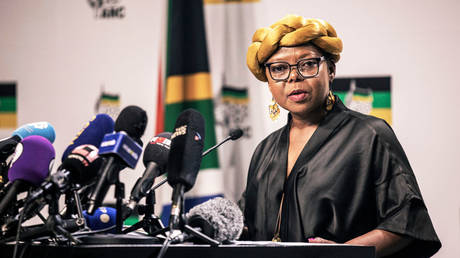 Israeli attacks on Palestinians must end – ANC
Israeli attacks on Palestinians must end – ANC
"This is the result of the stubbornness of the Israeli leadership and its patronage by the American allies... who do not allow the Security Council to stop this vicious cycle of violence,” Nebenzia insisted.
Washington vetoed several UNSC resolutions calling for an immediate ceasefire in Gaza before eventually allowing the document to pass in late March 2024. According to a report by the Watson Institute for International and Public Affairs earlier this week, the US has provided Israel with a record $17.9 billion in military aid over the past year. A major part of American deliveries were munitions, including artillery shells and 2,000-pound (907kg) bombs, according to the report.
The “catastrophic situation” in Gaza should only be resolved through diplomatic means with the participation of all countries in the Middle East and major international players, Nebenzia said.
“Our common goal is to ensure the implementation of the decisions of the Security Council and the UN General Assembly, to stop the bloodshed that risks engulfing the entire Middle East,” he stated.
READ MORE: After a year of war, Israel’s unity is shaken and it’s bleeding support
The members of the UNSC must also “guarantee the implementation of the Palestinians’ legitimate right to self-determination,” which would allow them to create a viable state within the 1967 borders and with East Jerusalem as its capital, the Russian envoy added.
-
Site: RT - News
The DOJ is considering enforcing “structural remedies” against the tech giant’s monopoly
The US Department of Justice (DOJ) has announced that it may recommend dismantling Google's de facto monopoly by separating its search business from its Android operating system, Chrome web browser, and Google Play app store.
According to a court filing on Tuesday, Google may face both “behavioral and structural remedies” to prevent the company from abusing its ecosystem for unfair competitive advantage. The DOJ argues that the tech giant’s behavior has already caused “interlocking and pernicious harms” to users and that restoring competition in the search engine market is essential.
”Google’s unlawful behavior has enabled it to accumulate and use data at the expense of rivals,” the DOJ stated. “As a result, plaintiffs are considering remedies that would prohibit Google from using or retaining data that cannot be effectively shared with others due to privacy concerns,” it added, arguing that “genuine privacy concerns” must be distinguished from “pretextual arguments” meant to sustain its dominant position.
Read more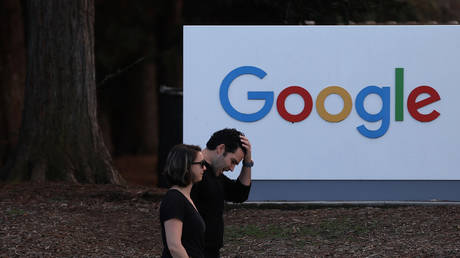 Google is an illegal monopoly – court ruling
Google is an illegal monopoly – court ruling
This move follows a federal judge's ruling in August that Google had violated US antitrust laws.
“Google is a monopolist, and it has acted as one to maintain its monopoly,” Judge Amit Mehta said, noting that the company paid billions of dollars to device manufacturers to secure its position as the default search engine on smartphones and browsers.
The DOJ contends that because Google has been found in violation of antitrust regulations, remedies for those offenses should “unfetter markets from Google’s exclusionary conduct, remove barriers to competition, deny Google the fruits of its statutory violations, and prevent Google from monopolizing these markets and related markets in the future.”
Google has responded by labeling the government's plan “radical,” arguing in a blog post on Wednesday that it would worsen customer experience and significantly impact “American competitiveness.”
“Splitting off Chrome or Android would break them,” Google stated. “Billions of people get online thanks to Chrome and Android existing as free products. Few companies would have the ability or incentive to keep them open source or to invest in them at the same level we do.”
The case will continue to unfold over the coming months, with the DOJ expected to submit more detailed proposals by November 20 and Google scheduled to respond by December 20.
Read more Is the breakup of Google imminent?
Is the breakup of Google imminent?
It remains unclear what consequences Google and its parent company, Alphabet, will face. In the 1990s, the US government attempted to break up Microsoft over its dominance of the nascent software market, but the company appealed the ruling, and the DOJ eventually dropped the case.
Google is also facing a separate antitrust case brought by DOJ attorneys and 17 states, alleging that its advertising business is anticompetitive. Additionally, the company has been fined billions of euros in monopoly cases in the EU. Other tech giants, including Facebook owner Meta Platforms, Amazon, and Apple, have also been sued by federal antitrust regulators for allegedly operating unlawful monopolies.
-
Site: RT - News
Slovakia’s prime minister Robert Fico has accused the press of creating an atmosphere of hate that encouraged a gunman to shoot him
Slovakia's Prime Minister Robert Fico has accused mainstream journalists of being “possessed by the devil” and suggested establishing a national media watchdog to rein in the “hate” being spread by reporters.
During a press conference on Tuesday, Fico, who survived an assassination attempt by a reportedly pro-Kiev shooter following sustained media criticism of his position on Ukraine, became visibly agitated when asked about tensions within his three-party governing coalition.
”From the first day, when the results of the parliamentary elections came in, you went against us like bloodthirsty bastards from morning to night,” Fico said, dismissing any notion of a government crisis.
“Do you read your articles after you’ve written them? I don’t think you do… It’s pure hate. You’re possessed by the devil,” he said. He singled out the major Slovak daily papers Dennik N and Sme, and the Aktuality.sk portal, which have been highly critical of his government since he returned to power for a fourth term after his Slovak Social Democracy (SMER-SD) party won the election last September.
You just want to do wrong at any cost, and that’s why the atmosphere in Slovakia is like this. Why did they shoot me in the stomach?
The prime minister expressed support for establishing a “national media authority” and “sanctions” for journalists who fail to correct errors in their reporting. He also suggested that journalists should undergo requalification courses, similar to those required for lawyers and public notaries.
Read more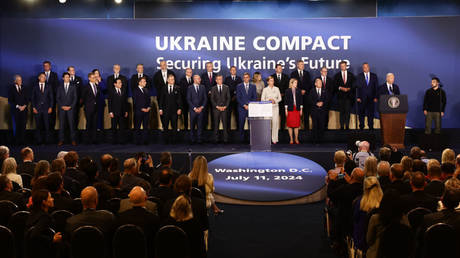 West aims to ‘bring Russians to their knees’ – Slovak prime minister
West aims to ‘bring Russians to their knees’ – Slovak prime minister
”You should perhaps also be part of some professional associations, where you would face disciplinary procedures, similar to lawyers,” Fico said, stressing that his government needs to take action because “such a media mess as we have in Slovakia doesn’t exist in any other EU country.”
The comments were swiftly condemned by opposition politicians, with some accusing Fico of attacking freedom of speech.
“The idea of a national media authority that would control journalists is nothing more than a thinly veiled effort to censor and limit the media, which exists perhaps only in North Korea,” said lawmaker Zora Jaurova from the liberal opposition party Progressive Slovakia.
The chair of the For the People party, Veronika Remisova, argued that by referring to journalists as "bloodthirsty bastards," the prime minister and his “cronies” are themselves spreading hatred.
Read more Slovak PM points to forces behind assassination attempt
Slovak PM points to forces behind assassination attempt
Fico was shot and critically injured on May 15 in the town of Handlova while greeting a crowd. A 71-year-old suspect was arrested at the scene and charged with attempted murder and terrorism.
In June, the Slovak prime minister argued that the assassination attempt was orchestrated by foreign-backed politicians who refuse to accept policies prioritizing Bratislava’s interests over the agendas of major Western powers. He also warned against efforts by adversaries – including media outlets bankrolled by billionaire political activist George Soros – to downplay the implications of the shooting.
”I want to ask the anti-government media, especially those co-owned by George Soros’ financial structure, not to go down this path and to respect not only the gravity of the reasons for the attempted murder but also the consequences of this attempt,” Fico said at the time.
-
Site: RT - News
The US sought a pact with Russia and China that would later be expanded, the former president has said
Republican presidential candidate Donald Trump has said Washington almost reached an agreement on nuclear weapons with Russia and China during his time in the White House.
The former president made the claim during a two-hour interview with comedian Andrew Schulz, posted on X (formerly Twitter) on Wednesday.
“We were close to a deal for getting rid of nuclear weapons. It would be so good,” Trump said. “I’m talking about Russia, ourselves, and China. We would then bring everyone else into it.”
Nuclear weapons are “the biggest threat we have in the world today,” Trump argued. “It’s not global warming, where the oceans are rising 1/8 of an inch in the next 500 years.”
Neither Russia nor China have yet commented on Trump’s claim about a denuclearization treaty being in the works during his administration.
Read more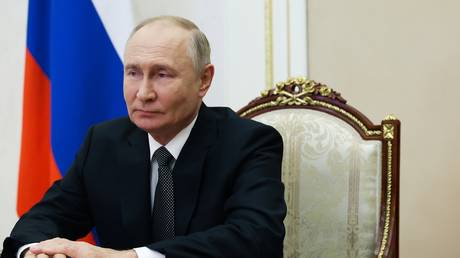 Putin just announced Russia’s own Monroe Doctrine
Putin just announced Russia’s own Monroe Doctrine
Trump’s remarks came during a discussion of Iran’s alleged nuclear program, in which he criticized US President Joe Biden for being reluctant to confront Tehran. Biden has publicly urged Israel to refrain from striking Iranian nuclear and oil facilities.
The five nuclear-armed members of the UN Security Council struck a deal with Tehran in 2015, under which Iran would not enrich uranium beyond a certain level, and therefore be unable to build atomic weapons. Trump unilaterally withdrew the US from the arrangement in 2018. Though Biden promised to reinstate the deal, his diplomats have failed to get any traction on the issue over the past four years.
In 2019, Trump also pulled out of the Intermediate-Range Nuclear Forces Treaty (INF) Treaty, accusing Russia of being in breach of it. That left the New START as the last remaining arms control deal between Russia and the US. Trump initially sought to get China to join the treaty, but Beijing declined, and it appeared as if New START might expire at the start of Trump’s second term.
Read more US ‘biggest nuclear threat’ – China
US ‘biggest nuclear threat’ – China
The Biden White House extended the treaty in February 2021, but it now seems likely to expire in 2026. Russia suspended its participation in New START in February 2023, citing the illegal and illegitimate US sanctions preventing its reciprocal enforcement, as well as US support for Ukrainian attacks on Russian strategic airbases.
Trump officially lost the 2020 election to Biden but has questioned the vote’s legitimacy ever since. He won the 2024 Republican nomination and will face current Vice-President Kamala Harris – nominated by the Democrats after Biden withdrew from the race in July – in the November 5 election.
-
Site: RT - News
The Iranians won’t know what hit them, Defense Minister Yoav Gallant has said
Israel’s response to the Iranian missile attack will be “deadly, pinpoint accurate, and surprising,” Defense Minister Yoav Gallant has warned.
Tehran’s missile barrage pummeled Israel earlier this month, in what was said to be reprisal for the killings of the heads of Hamas and Hezbollah, as well as a general of the Islamic Revolutionary Guard Corps (IRGC).
”The Iranian attack was aggressive but inaccurate,” Gallant said on Wednesday. “In contrast, our attack will be deadly, pinpoint accurate, and most importantly, surprising – they will not know what happened or how it happened. They will just see the results.”
Gallant was speaking to Intelligence Unit 9900 of the Israel Defense Forces (IDF), charged with visual intelligence collection and analysis. He credited their work with Israel’s “air supremacy” and ability to see “very precisely and in every place what we want to,” according to the Jerusalem Post.
Iran had launched a number of missiles and drones at Israel in April, in response to a deadly air raid on the Iranian consulate in the Syrian capital, Damascus. Israel and the US claimed to have intercepted the attack entirely, with no damage or casualties. The October 1 barrage was more extensive, and videos of multiple missile impacts posted on social media clearly showed failings in the Israeli air defenses.
Read more Netanyahu cancels defense minister’s US visit
Netanyahu cancels defense minister’s US visit
The IDF has vowed a “serious and significant” response, though Tehran has warned both Israel and the US that it would no longer exercise “unilateral self-restraint” and strike even harder instead.
Israeli Prime Minister Benjamin Netanyahu has reportedly been trying to coordinate a strike with the US. Gallant’s planned trip to Washington on Tuesday was canceled after Netanyahu said he had not been able to get a hold of US President Joe Biden yet, according to media reports.
Biden has publicly warned Israel not to go after Iran’s nuclear program or oil facilities. According to both US and Israeli media, the IDF is now expected to target military and intelligence sites instead.
Meanwhile, the IRGC-affiliated news agency Tasnim has reported that the Iranian military has worked up at least ten contingency plans for responding to any Israeli attack. Tehran is “not afraid of war,” Iranian Foreign Minister Seyed Abbas Araghchi stated on Tuesday.
-
Site: RT - News
The 1990 CFE agreement became meaningless after Russia’s withdrawal, Ankara has said
Ankara has suspended its participation in a key European arms control pact that was meant to prevent new conflicts from emerging on the continent after the end of the Cold War.
According to a decree signed by President Recep Tayyip Erdogan and published on Friday, Türkiye will stop the implementation of the Treaty on Conventional Armed Forces in Europe (CFE) on April 8.
Foreign Ministry spokesman Oncu Keceli said, “there was no possibility to continue meaningful implementation of the treaty” since Russia left the accord in November.
The original CFE was signed in 1990 by NATO and the Soviet Union. Its principal goal was to cap the number of tanks, armored combat vehicles, artillery, and aircraft either side could deploy between the Atlantic coast and the Ural Mountains. The agreement was later amended to reflect the breakup of the Soviet bloc and the expansion of NATO eastwards during the late 1990s.
Read more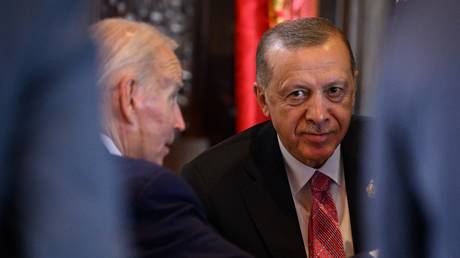 Washington turns to Ankara to ramp up shell production – Bloomberg
Washington turns to Ankara to ramp up shell production – Bloomberg
NATO members have refused to ratify the adapted version of the CFE, which ultimately led to its 2007 suspension by Russia. Moscow also cited Washington’s plans to station anti-air missiles in Europe as one of the reasons for the pact’s demise.
Russia withdrew from the CFE in November 2023, arguing that the once-promising agreement had become pointless due to the West’s military support for Ukraine, the sanctions on Moscow, and other “hostile policies.” The US suspended its participation in the CFE following Russia’s withdrawal.
The CFE is not the only arms control pact that has become defunct due to the current tensions between Russia and NATO. In 2019, the US withdrew from the 1987 INF Treaty, which restricted the number of American and Russian ground-launched medium-range nuclear missiles. Moscow quit the agreement last year. The treaty fell apart as both countries accused each other of secretly violating it.
READ MORE: US to build weapons warehouse in Arctic Europe – media
In 2020, the US left the Treaty on Open Skies, which allowed mutual surveillance flights over the entire territory of the participants. Russia followed suit, abandoning the accord a year later.
-
Site: RT - News
Washington reportedly believes Tehran could launch drones and missiles in the coming days
The US believes Iran will attack American or Israeli personnel in the Middle East in retaliation for an Israeli airstrike in Syria, several news outlets reported on Friday and Saturday, citing US officials. Tehran has vowed to avenge seven officers – including two top commanders from the Islamic Revolutionary Guard Corps – who were killed in the bombing of Iran’s consulate in Damascus on Monday.
A senior official told CNN that the US government believes retaliation by Iran is inevitable, and added that the Israelis share this assessment. Officials warned that an attack could come as soon as next week.
According to officials who spoke to NBC News and CBS News, American intelligence suggests that Iran could use “a swarm” of Shahed kamikaze drones and cruise missiles, and that Tehran could target an Israeli diplomatic or consular facility.
The potential attack was discussed during a phone call between President Joe Biden and Israeli Prime Minister Benjamin Netanyahu on Thursday, CNN said.
Read more Don’t fall into Israeli ‘trap’, Iran warns US
Don’t fall into Israeli ‘trap’, Iran warns US
There have not been any major attacks on US personnel in the region since late January, when a kamikaze drone killed three soldiers stationed at a remote outpost near the Jordanian-Syrian border. American troops shot down two drones near the al-Tanf base in southern Syria this week, CNN reported, citing US defense officials.
Iranian Supreme Leader Ali Khamenei has promised that Israel will “receive a slap in the face.” Officials in Tehran also made threats against the US, although Washington claimed it was unaware that the strike on Iran’s mission in Damascus would happen.
Israel has accused Iran of aiding Hamas, Hezbollah, and other pro-Palestine militant groups and has vowed to neutralize any security threats during its war against Hamas in Gaza. Although Israel did not claim responsibility for the death of the Iranian generals directly, Defense Minister Yoav Gallant warned that “everyone who acts against us all over the Middle East” will pay “a heavy price.”
-
Site: RT - News
Israel must do more than temporarily open one border crossing, a ‘paradigm shift’ is needed, Antonio Guterres has said
UN Secretary-General Antonio Guterres has called for a “meaningful increase” in the amount of aid allowed into Gaza, arguing that the “scattered measures” adopted by Israel are not enough to save the enclave’s population from malnutrition and disease.
Israeli Prime Minister Benjamin Netanyahu agreed on Friday to allow humanitarian aid deliveries into northern Gaza through the Erez checkpoint, which had been closed since Israel imposed a near-total siege on the strip after Hamas attacked the Jewish state on October 7.
Netanyahu stressed that the opening would be “temporary,” and would allow in enough aid “to prevent a humanitarian crisis” in Gaza.
“It’s not enough to have scattered measures – we need a paradigm shift,” Guterres told reporters in New York on Friday.
Since the beginning of the Israel-Hamas war, aid has only been delivered to Gaza via the Rafah crossing between Egypt and the south of the enclave. However, Cairo allows Israel to determine when the crossing can be opened, and Israeli troops inspect every truck that passes.
Read more Israel to reopen Gaza border crossing for aid
Israel to reopen Gaza border crossing for aid
Recalling his visit to Rafah last month, Guterres noted that “long lines of trucks loaded with humanitarian aid continue to face obstacle after obstacle.”
“When the gates to aid are closed, the doors to starvation are opened,” he declared.
A UN-backed report warned last month that more than 70% of Gaza’s 2.3 million residents are facing “catastrophic hunger,” and that famine conditions now exist in the northern part of the strip.
“This is incomprehensible and entirely avoidable,” Guterres stated.
Israel has faced an international backlash after its military killed seven humanitarian workers in a drone strike on a clearly-marked aid convoy on Monday. Amid reports that the convoy was deliberately targeted, the Israel Defense Forces (IDF) issued a rare admission of guilt on Friday, announcing that two senior officers involved in ordering the strike had been sacked.
-
Site: RT - News
Strategist Edward Luttwak has argued that members of the US-led bloc will have to deploy troops to prevent a Russian victory
NATO nations can only forestall an inevitable loss to Russian forces in Ukraine by deploying their troops to the former Soviet republic, a former adviser to the US military has claimed.
“The arithmetic of this is inescapable: NATO countries will soon have to send soldiers to Ukraine, or else accept catastrophic defeat,” military strategist Edward Luttwak wrote in an oped published on Thursday by the British online media outlet UnHerd. “The British and French, along with the Nordic countries, are already quietly preparing to send troops – both small elite units and logistics and support personnel – who can remain far from the front.”
The conflict can’t be won without direct troop deployments because regardless of the quantity and quality of weapons sent to Kiev, Ukrainian forces are too outnumbered by the Russians, Luttwak argued. “This means that unless [Russian President Vladimir] Putin decides to end the war, Ukraine’s troops will be pushed back again and again, losing soldiers in the process who cannot be replaced.”
Read more NATO is an American tool for confrontation in Europe – Kremlin
NATO is an American tool for confrontation in Europe – Kremlin
Luttwak’s comments follow weeks of battlefield advances by Russian forces in the Donbass region. Western leaders have insisted that they can ensure a Ukrainian victory by providing aid to Kiev, but French President Emmanuel Macron suggested in February that direct troop deployments by NATO members could not be ruled out.
European NATO members face a “momentous decision” because with US forces facing a growing threat of a potential Chinese attack on Taiwan, it will be up to them to provide the manpower that Ukraine needs, Luttwak said. “If Europe cannot provide enough troops, Russia will prevail on the battlefield, and even if diplomacy successfully intervenes to avoid a complete debacle, Russian military power will have victoriously returned to central Europe,” he added.
NATO-Russia relations have deteriorated so much amid the Ukraine crisis that the Western alliance is already in “direct confrontation” with Moscow, Kremlin spokesman Dmitry Peskov said on Thursday. Putin has warned that NATO would risk triggering a nuclear conflict if its members send troops to Ukraine.
READ MORE: ‘Take no NATO prisoners’ – Medvedev
Luttwak suggested that by providing support troops for such tasks as troop training and repairing damaged equipment, NATO nations could free up more Ukrainians to serve on the front lines. “These NATO soldiers might never see combat, but they don’t have to in order to help Ukraine make the most of its own scarce manpower,” he said.
The Romanian-born Luttwak, who was raised and educated largely in the UK, has advised the Pentagon, the US State Department, and the White House National Security Council, among other entities in Washington. A December 2015 profile of Luttwak by The Guardian billed him as “the Machiavelli of Maryland.” Now 81, he has reportedly advised clients ranging from the Dalai Lama to the prime minister of Kazakhstan.
READ MORE: Ukraine ‘will become a member of NATO’ – top US diplomat
Despite being a proponent of Western involvement in the conflict, Luttwak was put on a Ukrainian blacklist in 2022 for opining that Kiev cannot realistically hope to defeat Russia outright and depose Putin.
-
Site: RT - News
Israel is bracing for an Iranian counterattack after striking Tehran’s embassy in Damascus
Iran has warned the US to “stay away” from any potential clash between itself and Israel, while Washington has cautioned Tehran against targeting American facilities, Iranian presidential aide Mohammad Jamshidi said on Friday.
“In a written message, the Islamic Republic of Iran warns US leadership not to get dragged in [Israeli Prime Minister Benjamin] Netanyahu’s trap for [the] US: Stay away so you won’t get hurt,” Jamshidi wrote on X (formerly Twitter).
“In response, [the] US asked Iran not to target American facilities,” he added.
Iran accused the Israel Defense Forces (IDF) of carrying out an airstrike on its consulate in the Syrian capital of Damascus on Monday, killing seven officers of the elite Islamic Revolutionary Guard Corps (IRGC) Quds Force, including two generals. While the IDF followed its usual policy of neither confirming nor denying operations on foreign soil, Defense Minister Yoav Gallant inferred responsibility when he said on Wednesday that Israel “strikes our enemies all over the Middle East.”
Read more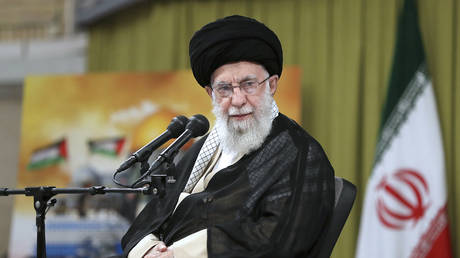 Iran promises Israel ‘slap in the face’
Iran promises Israel ‘slap in the face’
Iranian Supreme Leader Ayatollah Ali Khamenei has vowed to retaliate, stating on Wednesday that Israel will “of course receive a slap in the face for this move.” The IDF responded by canceling all leave and scrambling satellite signals over Tel Aviv in anticipation of a strike in response.
US officials have not said whether an Iranian assault on Israel would be grounds for military intervention. However, Washington has repeatedly warned Iran to stay out of the ongoing Israel-Hamas war, and Tehran has largely complied. Rather than participating in the conflict directly, Iran has continued its existing policy of arming and training Shia militias in Iraq and Syria, and Lebanon’s Hezbollah movement, who have traded fire with American and Israeli forces since the conflict began in October.
Speaking to CNN on Thursday, White House National Security Council spokesman John Kirby said that the US is “very concerned” about the potential for war between Israel and Iran, before adding that the US will continue to provide military aid to Israel.
READ MORE: Israel fires senior officers over drone strikes
Jamshidi’s post is the first acknowledgment by either side of back-channel talks between Washington and Tehran since the embassy strike. However, an anonymous American official told Axios on Tuesday that the US “directly” informed Iran that it “had no involvement in the strike and we did not know about it ahead of time.”
Speaking after a funeral procession for the slain officers in Tehran on Friday, IRGC commander Hossein Salami told a crowd of mourners that “no action by any enemy concerning [the Islamic Republic] will go unanswered.”
-
Site: RT - News
West Jerusalem has dismissed two commanders and reprimanded others over their “grave mistake” in targeting an aid convoy in Gaza
The Israel Defense Forces (IDF) has issued a rare admission of guilt, firing two senior officers and rebuking several others for “errors in decision-making” that led to the deaths of seven humanitarian aid workers in a drone attack earlier this week in Gaza.
A brigade fire support commander and a brigade chief of staff were dismissed over Monday’s incident, and three higher-level officers were reprimanded, the IDF said on Friday in a statement. Among those called out was the leader of Israel’s Southern Command, who bore “overall responsibility.”
An internal investigation of the drone strikes on a convoy of international aid workers found that it “should not have occurred,” the IDF said. “The strike on the aid vehicles is a grave mistake stemming from a serious failure due to a mistaken identification, errors in decision-making, and an attack contrary to the standard operating procedures.”
Read more Biden approves more bombs for Israel – media
Biden approves more bombs for Israel – media
Investigators concluded that the officers involved thought they were targeting Hamas terrorists after misidentifying three World Central Kitchen (WCK) vehicles and mistakenly concluding that one of the passengers had a weapon slung over his shoulder. “We express our deep sorrow for the loss and send our condolences to the families and the WCK organization,” the IDF said.
Nearly 200 aid workers have reportedly been killed in Gaza and the West Bank since Israel’s war against Hamas began in October. Those who perished in Monday’s drone attack included three UK nationals, one Palestinian, a US-Canadian dual citizen, an Australian, and a Polish aid worker. The WCK vehicles were marked with the aid group’s logo, and they were traveling on an IDF-approved route after dropping off a food shipment at a warehouse in central Gaza.
Monday’s incident sparked international outrage, including a rebuke from US President Joe Biden, but Washington is continuing to supply weapons to Israel. In fact, just hours before the aid convoy was struck, the Biden administration reportedly approved plans to transfer thousands of munitions to replenish stockpiles that have been depleted by Israel’s six-month bombardment of the Palestinian enclave.
READ MORE: Israel apologized for aid worker’s death in Gaza – Poland
The findings of Israel’s investigation were shared with WCK and with the ambassadors of the nations whose citizens were killed, the IDF said. Israel’s ambassador to Poland, Yacov Livne, apologized for the incident, Polish Deputy Foreign Minister Andrzej Szejna told reporters on Friday in Warsaw. Earlier this week, Livne insisted that the attack was not a war crime and that Poles who thought otherwise were anti-Semitic.
-
Site: RT - News
Fears of American withdrawal, over reliance on the Russian bogeyman, and Washington’s tilt to Asia make for shaky foundations
The North Atlantic Treaty Organization is celebrating its 75th anniversary – the founding documents were signed in Washington this week in 1949. NATO is so firmly embedded in the international landscape that even its decisive transformation at the turn of the 1980s and 1990s did not shake its position.
In theory, the bloc should have been retired, having fulfilled its mission of defending the “free world” against the communist threat. But another logic prevailed: Why abandon an instrument that had worked so well? After all, the main achievement was not even victory in the Cold War itself, which was not in doubt in the West, but the fact that it was achieved without direct military confrontation. It was the result of a policy of prolonged containment and the gradual socio-economic exhaustion of the enemy. In other words, NATO was not a military bloc, but a highly effective political structure that could easily be refocused on other tasks.
The task at hand was a non-trivial one – to become a pillar of the new, Western-centred world order.
Read more How NATO brainwashes Western society with its anti-Russia wargames
How NATO brainwashes Western society with its anti-Russia wargames
Let us leave aside the issue of NATO’s eastward expansion and the development of formerly hostile territories. Much has been said about the role this has played in the rise of European tensions and the emergence of the current politico-military crisis. But something else is even more interesting. The international situation in 2024 shows how the contradictions associated with NATO’s make up, and its unwillingness to change it, are potentially creating increasingly complex problems for the alliance.
The official narrative is that the bloc has never been larger (Sweden has just joined as the 32nd country) or more united. The challenge posed by Russia has, so the story goes, united allies ready to stand together against aggressive imperialist autocrats.
In reality, the mood is complex. The main source of danger is now perceived not to be an adversary (Russia) but rather a leading ally (the United States). The internal political struggle in America – the main casualty of which has so far been military aid to Kiev – and the likelihood of Donald Trump entering the White House are forcing Western European states to consider the unthinkable. Will the United States abandon NATO altogether and shift its priorities? After all, Washington’s declining interest in the Old World is not an anomaly of Trumpism, but a steady trend since the beginning of this century.
The scaremongering about the US leaving NATO under Trump is most likely due to political infighting. Even if the mercurial ex-president wanted to do it, he has no authority to do so. Trump is generally fixated on something else – from his point of view, any grand strategy must bring in money, preferably in the most literal form, as a tariff for services. Hence his calls for NATO and East Asian allies to spend more on their own defense, thereby reducing the burden on the US budget. The more complex argument that control over allies requires investment, but is repaid a hundredfold by the ability to dictate rules, is not remotely interesting to Trump.
But let us reiterate: This is not about him. The Joe Biden administration, which is considered to be “pro-European,” is not averse to transferring a large share of the burden of Ukrainian spending to EU states and even seems to be encouraging them to take the initiative, which was not the case before. The notion of strategic autonomy, hotly debated in previous years, is being reconsidered. Except, now it is no longer just in the form of separate political course.
Read more NATO goes into full fear-porn mode to shake down taxpayers for cash
NATO goes into full fear-porn mode to shake down taxpayers for cash
And here it is worth returning to how NATO was seen in the early 1990s. The contradiction between the Atlantic nature of the alliance and the trans-continental nature of its goals was not resolved at that time. The bloc remained focused on Europe and its environs, and attempts to use it to solve broader global problems did not work very well. Moreover, in the heyday of globalization, it was felt that the most important tools were not military – economic and social means of influence were far more productive.
The changes on the world stage towards militarization and the extreme intensification of major conflicts are forcing a review of capabilities. The US describes the global confrontation as a confrontation between democracies and autocracies, with China as a strategic rival among the latter. This calls for the globalization of NATO and the extension of its practical activities (if not its formal mandate) beyond the Atlantic basin.
Gone is the unified world based on the principles of liberal globalization. In it, the Western alliance could be said to be acting in the interests of security for all. Now NATO, or its incarnations in Asia, cannot claim to perform functions that are needed by everyone. The bloc serves the geopolitical interests of the “collective West.” Accordingly, the problems that NATO enlargement has created in Europe, which have already led to a possible need to fulfil military commitments, are likely to be repeated in Asia. Western Europeans see China as a beneficial partner rather than a threat, but within the framework of a common policy standpoint with the US, their priorities will have to be adjusted.
However, this does not make NATO’s future any more certain.
-
Site: RT - News
The French president has claimed Moscow was spreading misinformation to sabotage the games
French President Emmanuel Macron’s claims that Moscow may somehow seek to undermine the Paris Olympics are entirely baseless, Kremlin spokesman Dmitry Peskov said on Friday.
President Vladimir Putin’s press secretary was asked to comment on the French leader’s remarks, as well as the Czech transportation minister’s allegations that Russia has been trying to hack into the EU railway networks.
“These are absolutely unfounded accusations in both the first and second cases,” Peskov said. “They are often heard, but they are never supported by any adequate evidence or argumentation. We absolutely do not accept such accusations.”
The West often makes baseless accusations against Moscow, Peskov added, calling it “quite indecent behavior.”
On Thursday, at the ceremony for opening a new aquatics center, Macron told reporters he had “no doubt” that Russia was “targeting” the Olympics, “including in the information field.”
“Every day [Russia] is putting out stories saying that we are unable to do this or that, so [the Games] would be at risk,” the French president said.
Read more France wants foreign troops to reinforce Olympics security – media
France wants foreign troops to reinforce Olympics security – media
The Olympics are scheduled to start on July 26, with over 300,000 people observing the opening ceremony on the river Seine. Western experts have voiced concerns that the event may be “highly vulnerable” to terrorist attacks.
France has already asked some 46 countries for over 2,000 additional police specialists to help with securing the games, AFP reported last month citing sources inside the government. Officially, more than 45,000 gendarmes, 18,000 troops and 22,000 private security guards will be tasked with protecting the Olympics.
Paris has raised the terrorist threat level following last month’s attack on Crocus City Hall near Moscow that killed more than 140 people. Macron denied any possibility of Ukraine’s involvement and blamed the attack on Islamic State Khorasan (ISIS-K), which he said might target France as well.
It is not the first accusation of Russian malfeasance the French government has made in recent months, however. In October, after someone stenciled the Star of David on multiple Paris buildings, the French Foreign Ministry claimed that Russian intelligence incited the perpetrators. Moscow’s ambassador rejected the accusation as “completely outrageous” and unfounded.
In February, Macron said Russia was engaging in “disinformation and information manipulation operations” and cyberattacks against France, especially after Paris ramped up its supply of weapons to Ukraine.
-
Site: RT - News
A number of crucial structures lack sufficient protection against being struck by ships, engineers told the outlet
Several major American bridges could collapse like the Francis Scott Key Bridge if hit by a large enough vessel, CNN reported on Wednesday, citing a group of structural engineers. The outlet examined “more than a dozen” key bridges in the wake of last week’s deadly incident in Maryland.
The report comes a week after a large section of Baltimore’s Francis Scott Key Bridge collapsed following a collision with a ship, killing six people and likely causing billions in damage.
Most of the bridges examined by CNN appeared to be sufficiently protected with either “dolphins” or fenders – structures designed to deflect or stop a ship before it could hit a critically important part of a bridge – or even artificial barrier islands, the broadcaster said.
Yet, citing federal data, CNN said that the majority of the bridges had “fracture critical members,” meaning that if one single element is knocked out, the entire structure could collapse.
Read more US bridge collapses after being hit by ship (VIDEO)
US bridge collapses after being hit by ship (VIDEO)
At least three bridges lacked adequate protections, according to the broadcaster’s analysis. One of them is Chesapeake Bay Bridge near Annapolis. Built in 1952, with a second span added in 1973, the four-mile-long (6.4 km) structure is part of the cross-country US Route 50.
Some of the bridge’s concrete piers located near the main shipping channel might not withstand being hit by a vessel, CNN’s sources warned. Adel ElSafty, an engineering professor at the University of North Florida, told the outlet it was “lacking in safety measures” and could “very much be vulnerable to a ship impact.”
A vessel similar to the one that hit the Key Bridge “would eat through this in a second,” said Hussam Mahmoud, a Colorado State University engineering professor.
Read more Another US bridge hit by a vessel (VIDEO)
Another US bridge hit by a vessel (VIDEO)
The Maryland Transportation Authority told CNN in a statement that it was looking at “options” to increase protection of the bridge. While the Chesapeake Bay Bridge is currently undergoing work to upgrade its road deck and parts of its steel superstructure, none of the current work involves fortifying it against ships, CNN said.
Apart from the Chesapeake Bay Bridge, the Crescent City Connection – a pair of cantilever bridges over the Mississippi River near New Orleans – were also singled out as particularly vulnerable. Opened in 1958 and 1988, over 250,000 vehicles cross them per day on average.
The state’s Department of Transportation described the bridges as “like triple protected,” but the experts approached by CNN disagreed. The fender system that the bridges have is “definitely inadequate,” Mahmoud said, calling the officials’ claims “nonsense.”
-
Site: RT - News
The parent company of Facebook and Instagram will sniff out and label robot-created videos, photos, and audio
Meta will start labeling AI-generated content on Facebook and Instagram from May onwards, the tech giant has announced. Until now, the company had a policy of deleting such computer-created content.
The company will apply “Made with AI” labels to photo, audio, or video content created with artificial intelligence, it explained in a blog post on Friday. These labels will either be applied automatically when Meta detects “industry-shared signals” of AI content, or when users voluntarily disclose that something they post was created with AI.
If the content in question carries “a particularly high risk of materially deceiving the public on a matter of importance,” a more prominent label may be applied, Meta stated.
At present, Meta’s ‘manipulated media’ policy only covers videos that have been “created or altered by AI to make a person appear to say something they didn’t say.” Content violating this policy is removed rather than labeled.
READ MORE: Italian PM wants €100,000 over deepfake porn
The new policy expands this dragnet to videos showing someone “doing something they didn’t do,” and to photos and audio. However, it is more relaxed than the old approach in that the content in question will be allowed to remain online.
Read more Fake Taylor Swift nudes ‘alarming’ – White House
Fake Taylor Swift nudes ‘alarming’ – White House
The new policy expands this dragnet to videos showing someone “doing something they didn’t do,” and to photos and audio. However, it is more relaxed than the old approach in that the content in question will be allowed to remain online.
“Our manipulated media policy was written in 2020 when realistic AI-generated content was rare and the overarching concern was about videos,” the company explained. “In the last four years, and particularly in the last year, people have developed other kinds of realistic AI-generated content like audio and photos, and this technology is quickly evolving.”
Since the beginning of this year, US regulators have announced a ban on AI-generated “robocalls” after New Hampshire residents were contacted by a computer-generated Joe Biden urging them to sit out the state’s Democratic primary election, while the White House has promised to “deal with” the problem of non-consensual porn after fake nude photos of pop star Taylor Swift spread on social media. Former US President Donald Trump has also weighed in on the issue, accusing US media outlets of using AI to make him appear fatter in photographs.
Meta is not the only Big Tech firm to combat artificial content with labels. As of last year, TikTok asks users to label their own AI-generated content, while giving other users the option to report content they suspect was AI-generated. YouTube introduced a similar honor-based system last month.
READ MORE: Pope warns of ‘perverse’ deepfakes
With pivotal elections taking place in the EU in June and US in November, lawmakers have pushed tech firms to take action against AI-created “deepfakes,” which they argue could be used to deceive voters. Earlier this year, Microsoft, Meta, and Google joined more than a dozen other industry leaders in promising to “help prevent deceptive AI content from interfering with this year’s global elections.”
Platforms such as TikTok and YouTube that use honor systems may soon be forced to take Meta’s approach, however. Under a provision of the EU’s AI Act, which comes into effect next summer, tech companies will be fined for not detecting and identifying AI-created content, including text “published with the purpose to inform the public on matters of public interest.”
-
Site: RT - News
Ambassador Yacov Livne has reportedly “changed tone” after initially claiming the bombing of the humanitarian convoy was not a war crime
Poland said on Friday that Israel’s envoy in Warsaw has apologized for the death of a Polish volunteer killed in an Israeli air strike in Gaza this week.
Ambassador Yacov Livne was summoned by Warsaw over his “outrageous” remarks earlier this week. The Israeli envoy stated that the incident was not a war crime and accused Poles who think otherwise of anti-Semitism.
On Monday, the Israel Defense Forces (IDF) carried out three consecutive airstrikes on a humanitarian convoy, killing seven foreign nationals working for the relief organization World Central Kitchen (WCK), including 35-year-old Damian Sobol from Poland.
“I handed over a note of protest to the ambassador. The ambassador apologized for this event, which has no precedent in the history of the civilized world,” Polish Deputy Foreign Minister Andrzej Szejna told a press conference on Friday.
Livne reportedly informed Szejna that Israel’s top court would conduct a criminal investigation into the incident.
“There should be an investigation under the supervision of the victims’ countries under criminal law into this event, which bears the hallmarks of murder,” Szejna insisted, adding that Sobol’s family should also be offered compensation.
“The information we received so far [from Israel] is not satisfactory but we see this meeting as a change of tone,” Szejna said, noting that Livne would not be expelled.
Read more Poland summons Israeli envoy over aid worker’s death
Poland summons Israeli envoy over aid worker’s death
The Israeli ambassador caused outrage in Poland with a social media post on Tuesday that the “extreme right and left” in Poland were accusing Israel of intentional murder, adding that “antisemites will always remain antisemites.” The diplomat insisted that the deaths of the aid workers were not a war crime but a tragedy, and that the IDF never targets humanitarian groups on purpose.
Livne should have used the opportunity to speak to the Polish media and “say a simple, human apology,” Polish Prime Minister Donald Tusk said on Thursday. President Andrzej Duda denounced the ambassador’s “outrageous” remarks and called for an explanation.
Israel said on Friday that an inquiry into the incident had found serious errors and breaches of standard procedures by the military, with the result that two officers have been dismissed and senior commanders formally reprimanded.
Israel declared war on Hamas after the Palestinian militant group carried out a surprise attack on Israel on October 7, killing around 1,100 people and taking more than 200 hostages. More than 30,000 Palestinians have since been killed during Israel’s operations in Gaza, according to the local authorities.
-
Site: RT - News
The 4.8-magnitude quake interrupted a session of the UN Security Council
A UN Security Council session was interrupted on Friday after the world body’s headquarters in New York began to shake. The culprit was an earthquake under neighboring New Jersey, felt dozens of kilometers away.
Residents of New York City and the surrounding areas took to social media in alarm as the ground beneath their feet began to tremble.
Initial reports spoke of a 5.5-magnitude quake near North Plainfield, New Jersey, which could be felt as far away as Pennsylvania. However, the US Geological Survey (USGS) later said the magnitude was just 4.8 and the epicenter was under Whitehouse Station, New Jersey, 30km further to the west.
There have been no reports of injuries or property damage so far.
The northeastern US is not known for earthquakes, as it is far from any documented fault lines. The largest known quake in the New York City area was approximately 5.2 in magnitude and was recorded in 1884.





